Men In Black: The Album
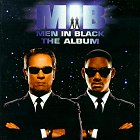 Avoid this CD at all costs. Especially if you hate rap music.
Avoid this CD at all costs. Especially if you hate rap music.
I have never been so disappointed in a CD purchase as I was with this CD. While Men In Black was enjoying its success in the theaters, this CD was released to the stores. And, despite having the name Men In Black (plus Will Smith and Tommy Lee Jones on the cover), outside of the first track and the last two tracks, this mostly rap album pays only passing reference to the movie. The only tracks worth listening to are Will Smith’s “Men In Black” on track one (which, if you own the video, you already have it), and the opening and closing themes by Danny Elfman (which are also part of Men In Black: The Score).
 The CD insert is a long strip, with photos on one side of the strip, and credits for each song on the other side.
The CD insert is a long strip, with photos on one side of the strip, and credits for each song on the other side.
If you enjoyed the movie, skip this CD and get Men In Black: The Score instead.
- Men In Black (3:45, performed by Will Smith)
- We Just Wanna Party With You (4:32, performed by Snoop Doggy Dogg featuring JD)
- I’m Feeling You (4:40, performed by Ginuwine)
- Dah Dee Dah (Sexy Thing) (4:11, performed by Alicia Keys)
- Just Cruisin’ (3:59, performed by Will Smith)
- The ‘Notic (5:20, performed by The Roots featuring D’Angelo)
- Make You Happy (4:06, performed by Trey Lorenz)
- Escobar ’97 (3:31, performed by NAS)
- Erotic City (4:34, performed by Emoja)
- Same Ol’ Thing (4:27, performed by A Tribe Called Quest)
- Killing Time (5:07, performed by Destiny’s Child)
- Waiting For Love (3:46, performed by 3T)
- Chanel No. Fever (3:23, performed by De La Soul)
- Some Cow Fonque (More Tea Vicar?) (5:09, performed by Buckshot LeFonque)
- M.I.B. Main Theme (2:58, written and produced by Danny Elfman)
- M.I.B. Closing Theme (2:37, written and produced by Danny Elfman)
Released by: Sony
Release date: 1997
Total running time: 66:05
The Move – The Early Years
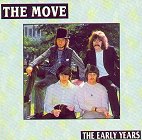 This disc reproduces all but a couple of songs from the first Move album. I’d better explain this obscure group and frequent answer to radio trivia contests, because the Move is one of my all-time favorites, and probably my hands-down favorite from the 1960s. The original Move consisted of Roy Wood, Bev Bevan, Trevor Burton, Ace Kefford and Carl Wayne from Birmingham, England, a group of musicians who got fed up with the strictures of the cover bands they played in, and decided to form their own group to play originals and get a record contract. From about this time, two very important bands were formed in Birmingham: the Move and the Moody Blues. The latter is still around today, while the former transformed into the Electric Light Orchestra (my all-time favorite rock/pop act) in 1971. But enough of the future – the
This disc reproduces all but a couple of songs from the first Move album. I’d better explain this obscure group and frequent answer to radio trivia contests, because the Move is one of my all-time favorites, and probably my hands-down favorite from the 1960s. The original Move consisted of Roy Wood, Bev Bevan, Trevor Burton, Ace Kefford and Carl Wayne from Birmingham, England, a group of musicians who got fed up with the strictures of the cover bands they played in, and decided to form their own group to play originals and get a record contract. From about this time, two very important bands were formed in Birmingham: the Move and the Moody Blues. The latter is still around today, while the former transformed into the Electric Light Orchestra (my all-time favorite rock/pop act) in 1971. But enough of the future – the  majority of this disc’s material is derived from the Move’s 1968 debut album, and it’s worth many a listen. In the space of that first album, the band went from pseudo-psychedelic rockers to ballads with string players (shades of ELO!) to Monkees-like pop numbers. It was a flashpoint of amazing diversity, and even their later releases were nowhere near as inventive.
majority of this disc’s material is derived from the Move’s 1968 debut album, and it’s worth many a listen. In the space of that first album, the band went from pseudo-psychedelic rockers to ballads with string players (shades of ELO!) to Monkees-like pop numbers. It was a flashpoint of amazing diversity, and even their later releases were nowhere near as inventive.
- Night of Fear (2:13)
- Disturbance (2:47)
- I Can Hear The Grass Grow (3:00)
- Flowers in the Rain (2:28)
- (Here We Go Round) The Lemon Tree (3:02)
- Fire Brigade (2:24)
- The Girl Outside (2:56)
- Mist on a Monday Morning (2:33)
- Cherry Blossom Clinic Revisited (7:42)
- Wild Tiger Woman (2:40)
- Omnibus (3:56)
- Blackberry Way (3:36)
- Something (3:31)
- Curly (2:45)
- This Time Tomorrow (3:41)
- Beautiful Daughter (2:38)
- Brontosaurus (4:27)
- Lightning Never Strikes Twice (3:12)
- When Alice Comes Back to the Farm (3:43)
- What? (6:44)
Released by: Dojo
Release date: 1997
Total running time: 65:58
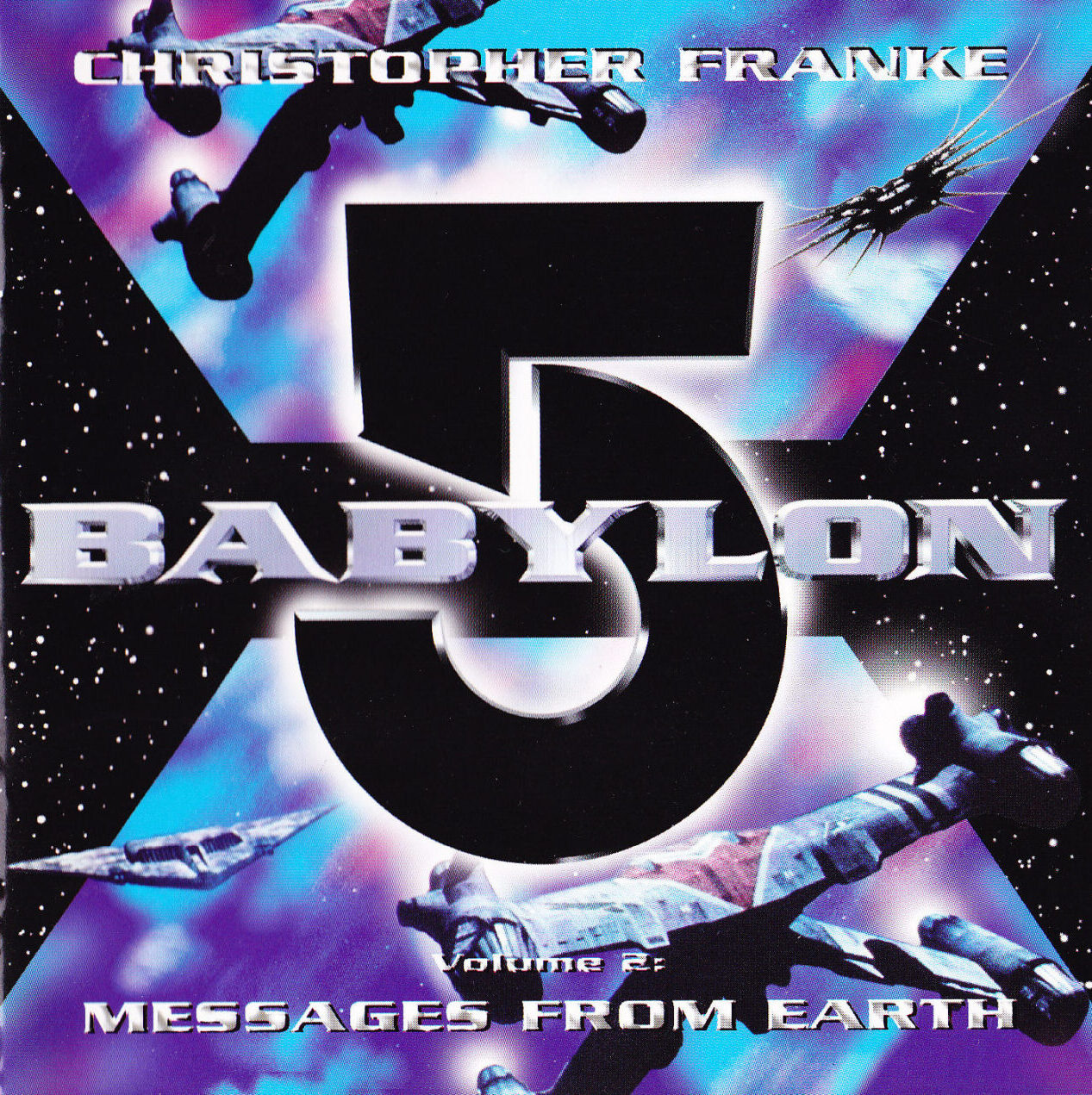
Babylon 5: Messages From Earth
This superb collection of music from Babylon 5’s second, third and fourth years could not be more different from its predecessor. Very like the show itself, Christopher Franke’s musical scores on his second B5 album grow darker, harder-hitting, more avant-garde, more epic and even a little more unnerving and disturbing. Beginning with a nicely extended version of the first season’s main title theme, the album switches gears abruptly as the first track of score music – kicking off with the first notes heard in the fourth season’s premiere episode – immediately waxes apocalyptic and much more action-oriented than volume one’s mystic passages. Still adhering to the first album’s leanings toward long orchestral suites with seldom-accurate track titles, Messages From Earth does make a concession to the more traditional discrete division of cues on soundtrack albums by including each season’s different theme song on its own track. This album’s ominously lovely choral textures will have an addictive effect on any  Babylon 5 fan, though I highly recommend it to anyone. Unusual juxtapositions of percussion, orchestra, electronics, and choir, along with Franke’s tendency to disregard western major and minor tonalities with reckless abandon, make this a gripping listen, especially track 4, “Z’Ha’Dum”, which is actually mostly comprised of music from an intense episode called The Long, Twilight Struggle a year earlier.
Babylon 5 fan, though I highly recommend it to anyone. Unusual juxtapositions of percussion, orchestra, electronics, and choir, along with Franke’s tendency to disregard western major and minor tonalities with reckless abandon, make this a gripping listen, especially track 4, “Z’Ha’Dum”, which is actually mostly comprised of music from an intense episode called The Long, Twilight Struggle a year earlier.
- Main Title – season 1 / extended (3:16)
- Messages from Earth – music from Severed Dreams (10:05)
- Main Title – season 2 (1:30)
- Z’Ha’Dum – music from The Long, Twilight Struggle 12:19)
- Main Title – season 3 (1:31)
- Severed Dreams – music from Messages from Earth (15:37)
- Main Title – season 4 (1:29)
- Voices of Authority – music from A Late Delivery from Avalon (11:26)
Released by: Sonic Images
Release date: 1997
Total running time: 57:30
Depeche Mode – Black Celebration
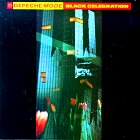 This is the point at which Depeche Mode’s sound started shifting from the interestingly experimental sampling and synths of Some Great Reward to a much heavier, more industrial sound… and I have to confess, they lost me for a long time after this one last really good album. If anything saves this album, it’s the slower songs and ballads, such as “A Question Of Lust”, “World Full Of Nothing”, and the menacing “Dressed In Black”. Faster-paced songs worthy of mention include “A Question Of Time” and the atypically bouncy “But Not Tonight”. The vocals on Black Celebration seem to be above the par set for the previous releases, though the album also falls flat for
This is the point at which Depeche Mode’s sound started shifting from the interestingly experimental sampling and synths of Some Great Reward to a much heavier, more industrial sound… and I have to confess, they lost me for a long time after this one last really good album. If anything saves this album, it’s the slower songs and ballads, such as “A Question Of Lust”, “World Full Of Nothing”, and the menacing “Dressed In Black”. Faster-paced songs worthy of mention include “A Question Of Time” and the atypically bouncy “But Not Tonight”. The vocals on Black Celebration seem to be above the par set for the previous releases, though the album also falls flat for  trying to copy the style of the group’s own well-received earlier material – “Sometimes” and “It Doesn’t Matter Two” are conscious attempts to reproduce earlier songs such as “Somebody” and “It Doesn’t Matter” from the previous album, and both fall very, very flat. This album is a very mixed bag.
trying to copy the style of the group’s own well-received earlier material – “Sometimes” and “It Doesn’t Matter Two” are conscious attempts to reproduce earlier songs such as “Somebody” and “It Doesn’t Matter” from the previous album, and both fall very, very flat. This album is a very mixed bag.
- Black Celebration (4:55)
- Fly on the Windscreen – final (5:18)
- A Question of Lust (4:20)
- Sometimes (1:53)
- It Doesn’t Matter Two (2:50)
- A Question of Time (4:10)
- Stripped (4:16)
- Here is the House (4:15)
- World Full Of Nothing (2:50)
- Dressed in Black (2:32)
- New Dress (3:42)
- But Not Tonight (4:15)
Released by: Mute
Release date: 1986
Total running time: 45:16
Julianna Raye – Something Peculiar
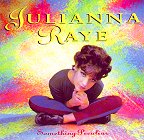 There were two deciding factors in my getting this album – it was in a 50-cent CD cutout bin, and it was produced by Jeff Lynne. Well, maybe that’s a bit harsh – it turned out to be worth at least 50 cents! I must confess that I know absolutely nothing at all about this particular artist, her history, previous or later releases (if any), outside of this one album (though I have since found out that she sang backup on a Claudia Christian single). Most of it is good, even if – in a very rare instance – the music is overpowered by Jeff Lynne’s production in a few spots. Standout tracks include “Limbo” and, my favorite, the title track, both of which benefit from the trademark sound of their producer. Several other tunes, however, suffer from an
There were two deciding factors in my getting this album – it was in a 50-cent CD cutout bin, and it was produced by Jeff Lynne. Well, maybe that’s a bit harsh – it turned out to be worth at least 50 cents! I must confess that I know absolutely nothing at all about this particular artist, her history, previous or later releases (if any), outside of this one album (though I have since found out that she sang backup on a Claudia Christian single). Most of it is good, even if – in a very rare instance – the music is overpowered by Jeff Lynne’s production in a few spots. Standout tracks include “Limbo” and, my favorite, the title track, both of which benefit from the trademark sound of their producer. Several other tunes, however, suffer from an  identity crisis – who’s more responsible for the sound we’re hearing, Julianna Raye or Jeff Lynne? In many cases, it’s a toss-up, and results in my first criticism of Lynne’s production work being too thick – the producer’s job should be to support, not overpower, the talent. Worth a listen, perhaps for no other reason than so you can figure out what I’m talking about here!
identity crisis – who’s more responsible for the sound we’re hearing, Julianna Raye or Jeff Lynne? In many cases, it’s a toss-up, and results in my first criticism of Lynne’s production work being too thick – the producer’s job should be to support, not overpower, the talent. Worth a listen, perhaps for no other reason than so you can figure out what I’m talking about here!
- Limbo (3:12)
- I’ll Get You Back (3:42)
- Tell Me I’m Alright (3:09)
- Taking Steps (3:14)
- Peach Window (2:12)
- Something Peculiar (3:45)
- Roses (3:24)
- Laughing Wild (3:56)
- In My Time (3:04)
- My Tribe (4:02)
- Nicola (3:08)
Released by: Reprise
Release date: 1992
Total running time: 37:01
Romantics – What I Like About You & other Romantic hits
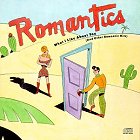 A Romantics “best of” album is sort of like a Simply Red “best of” album – once you get past the two or three songs that got a lot of radio airplay, what are you going to fill out the rest of the album with? Granted, I like “Talking In Your Sleep” and “What I Like About You” a lot – like the Police, they’re comfort music, reminding me of long summer days of being driven around by my
A Romantics “best of” album is sort of like a Simply Red “best of” album – once you get past the two or three songs that got a lot of radio airplay, what are you going to fill out the rest of the album with? Granted, I like “Talking In Your Sleep” and “What I Like About You” a lot – like the Police, they’re comfort music, reminding me of long summer days of being driven around by my  older brother through the insanely-arranged streets of Fort Smith – but unlike a “best of,” say, Kansas or Howard Jones, this is one of those albums that most people just lock down on one or two tracks. The Romantics were fine for their time, but they bring back memories of some contemporaries of theirs – the Stray Cats, another early-80s band who thrived briefly on the novelty of what amounted to a single style.
older brother through the insanely-arranged streets of Fort Smith – but unlike a “best of,” say, Kansas or Howard Jones, this is one of those albums that most people just lock down on one or two tracks. The Romantics were fine for their time, but they bring back memories of some contemporaries of theirs – the Stray Cats, another early-80s band who thrived briefly on the novelty of what amounted to a single style.
- What I Like About You (2:57)
- Rock You Up (3:37)
- When I Look In Your Eyes (2:59)
- Open Up Your Door (3:58)
- Shake A Tail Feather (3:31)
- Talking In Your Sleep (3:55)
- One In A Million (3:41)
- Test of Time (3:23)
- A Night Like This (5:06)
- Tell It To Carrie (3:24)
Released by: Epic
Release date: 1996
Total running time: 36:33
ELO Part II – One Night: Live In Australia
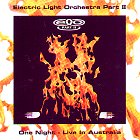 Just as often as ELO Part II fails to live up to its ancestry in the studio, this band amazes me live. I mentioned earlier that Greatest Hits Live With The Moscow Symphony Orchestra is not an accurate reporting of ELO Part II’s live sound. On the other hand, One Night is good – it’s a true rarity, a live album I actually like. For all of the failings of the original material written by Part II, they do justice to Jeff Lynne’s classic ELO numbers that the original band simply never had the sheer number of performers to pull off. And to make this album even better, there’s a recording of “Ain’t Necessarily So”, a real humdinger of an original tune which is specially tailored to the new band’s strong points: harmony
Just as often as ELO Part II fails to live up to its ancestry in the studio, this band amazes me live. I mentioned earlier that Greatest Hits Live With The Moscow Symphony Orchestra is not an accurate reporting of ELO Part II’s live sound. On the other hand, One Night is good – it’s a true rarity, a live album I actually like. For all of the failings of the original material written by Part II, they do justice to Jeff Lynne’s classic ELO numbers that the original band simply never had the sheer number of performers to pull off. And to make this album even better, there’s a recording of “Ain’t Necessarily So”, a real humdinger of an original tune which is specially tailored to the new band’s strong points: harmony  and hard rock. I hope they commit this song to tape on their next studio album – they could actually turn into real contenders. I highly recommend this to you – or better yet, if ELO Part II comes anywhere near you, get some tickets and go see the show, and this album will make an excellent reminder of the group’s live sound.
and hard rock. I hope they commit this song to tape on their next studio album – they could actually turn into real contenders. I highly recommend this to you – or better yet, if ELO Part II comes anywhere near you, get some tickets and go see the show, and this album will make an excellent reminder of the group’s live sound.

- Standing In The Rain (4:43)
- Evil Woman (4:01)
- Don’t Wanna (4:04)
- Showdown (4:55)
- Can’t Get It Out Of My Head (6:36)
- Whiskey Girls (3:47)
- Livin’ Thing (3:53)
- One More Tomorrow (5:11)
- Mr. Blue Sky (5:01)
- Telephone Line (4:49)
- Ain’t Necessarily So (4:02)
- Strange Magic (2:11)
- Sweet Talking Woman (2:04)
- Confusion (1:52)
- Do Ya (2:27)
- Rockaria! (3:15)
- Roll Over Beethoven (5:55)
- Don’t Bring Me Down (4:19)
Released by: CMC International Records
Release date: 1997
Total running time: 73:13
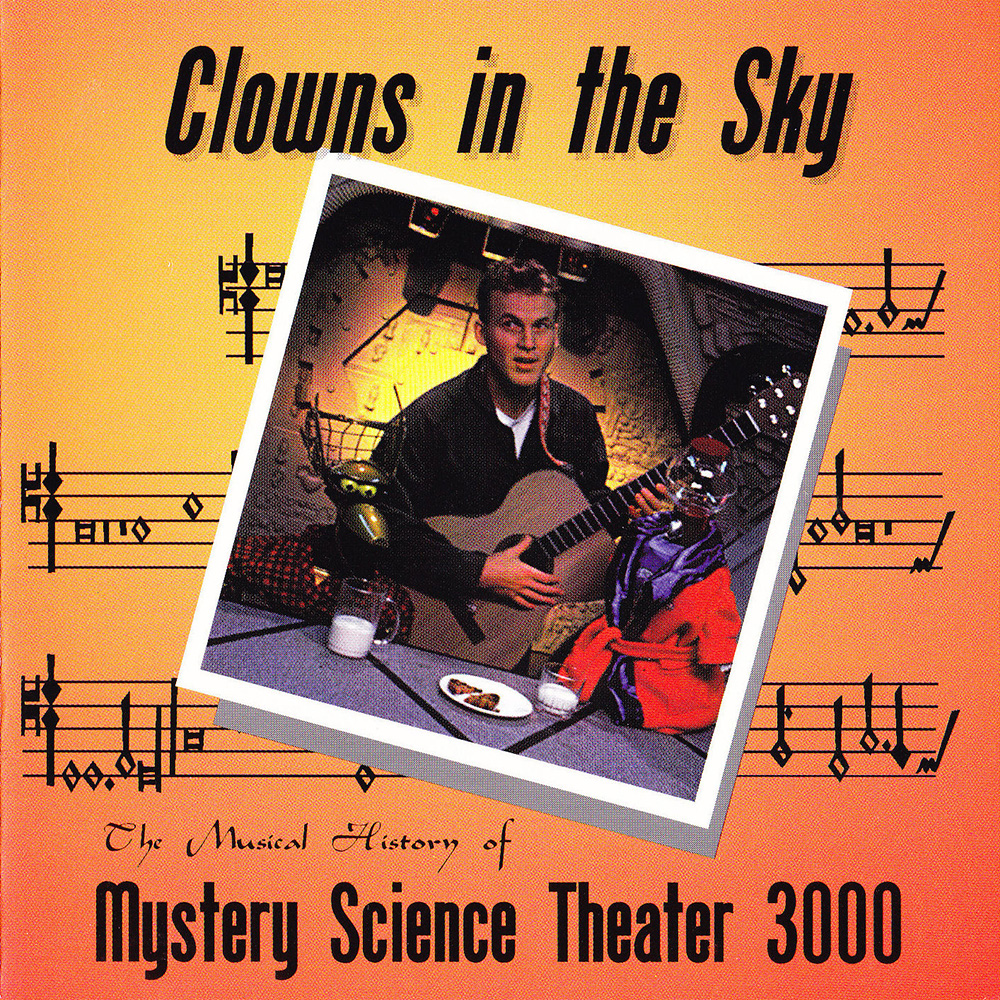
Mystery Science Theater 3000: Clowns In The Sky
 Why, you ask, would anyone want to listen to this oddball variety of the usually simplistic comedy numbers written and performed by a handful of outrageous characters who are usually associated with poking fun at really lousy movies? Well, I dunno. I suppose because it’s a proverbial hoot. I also suppose one listening to this album would have to be a big fan of Mystery Science Theater 3000 in order to even care about these songs, which form one of the biggest recorded musical in-jokes ever pressed on CD (aside from whatever album Michael Jackson released most recently). Join orignal MST host Joel Hodgson, current host Mike Nelson, the lovable robots Crow, Tom Servo and Gypsy, and mad scientists Dr. Forrester and TV’s Frank as they warble, croon and sometimes croak their way through a variety of humorous tunes from various installments of the show. My favorites on this album have to be “Master Ninja Theme Song”, “Toobular Boobular Joy”, “Tribute To Pants”, and “The Greatest Frank Of All”, Much as I liked Joel and still do, I have to confess that after hearing nearly an hour of both hosts, Mike comes out as the better singer of the two. And as much as I liked TV’s Frank, I think his singing is mentioned in the Geneva Convention in the “please don’t” section, somewhere between chemical weapons and torture! If I have but a couple of tiny complaints, I would have liked a little more dialogue (a complaint I have never made before, because I normally cannot stand dialogue on soundtrack or music albums such as Apollo 13), and
Why, you ask, would anyone want to listen to this oddball variety of the usually simplistic comedy numbers written and performed by a handful of outrageous characters who are usually associated with poking fun at really lousy movies? Well, I dunno. I suppose because it’s a proverbial hoot. I also suppose one listening to this album would have to be a big fan of Mystery Science Theater 3000 in order to even care about these songs, which form one of the biggest recorded musical in-jokes ever pressed on CD (aside from whatever album Michael Jackson released most recently). Join orignal MST host Joel Hodgson, current host Mike Nelson, the lovable robots Crow, Tom Servo and Gypsy, and mad scientists Dr. Forrester and TV’s Frank as they warble, croon and sometimes croak their way through a variety of humorous tunes from various installments of the show. My favorites on this album have to be “Master Ninja Theme Song”, “Toobular Boobular Joy”, “Tribute To Pants”, and “The Greatest Frank Of All”, Much as I liked Joel and still do, I have to confess that after hearing nearly an hour of both hosts, Mike comes out as the better singer of the two. And as much as I liked TV’s Frank, I think his singing is mentioned in the Geneva Convention in the “please don’t” section, somewhere between chemical weapons and torture! If I have but a couple of tiny complaints, I would have liked a little more dialogue (a complaint I have never made before, because I normally cannot stand dialogue on soundtrack or music albums such as Apollo 13), and  maybe the Torgo theme from the truly wretched movie Manos: The Hands of Fate, though I realize that’s not under their copyright. But these are minor nits to pick. If you too want to hear these particular voices in your head, you’ll need to order it through the MST 3000 Info Club (see the link below).
maybe the Torgo theme from the truly wretched movie Manos: The Hands of Fate, though I realize that’s not under their copyright. But these are minor nits to pick. If you too want to hear these particular voices in your head, you’ll need to order it through the MST 3000 Info Club (see the link below).
- MST 3000 theme: 1989-1993 Joel version (1:23)
- My Creepy Girl (2:22)
- Godzilla Genealogy Bop (1:56)
- If Chauffeurs Ruled the World (2:22)
- Music from Some Guys in Space (1:47)
- Tibby, Oh Tibby (2:44)
- The Plate Spinning Song (1:04)
- A Clown in the Sky (2:11)
- The Waffle Song (0:50)
- Let’s Have a Patrick Swayze Christmas (3:21)
- Master Ninja Theme Song (1:14)
- Tribute to Pants (1:33)
- Gypsy Rose Me! (0:37)
- Kim Cattrall (1:03)
- Ode On Estelle (3:32)
- Gypsy Moons (2:04)
- Hired! Original Broadway Cast (3:21)
- What A Pleasant Journey (1:46)
- MST 3000 theme song: 1993-1995 Mike version with Frank (1:24)
- The Janitor Song (2:17)
- NummyMuffinCoocolButter (1:37)
- Merry Christmas…If That’s OK (2:04)
- The Greatest Frank Of All (1:27)
- Livin’ In Deep 13 (0:48)
- Bouncy Upbeat Song (1:31)
- Whom Shall I Kill? (2:20)
- Tubular Boobular Joy (1:08)
- MST 3000 theme song: 1995-1996 Mike version with Pearl (1:36)
- Mighty Science Theater – closing theme (1:02)
Released by: Best Brains
Release date: 1996
Total running time: 52:04
The Move – Shazam / Something Else From The Move
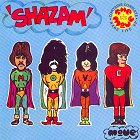 Shazam was the first Move album I ever found on vinyl, and it’s certainly a unique slice of late 60s/early 70s rock. Having lost Carl Wayne, who wanted to indulge in smoother crooning than the rest of the band desired, to a cabaret singing career, this album saw a bit of overcompensation for that loss by leaning in a much heavier rock direction, almost on the doorstep of heavy metal. But there is still evidence of the group’s pop roots in the opening numbers “Hello Susie”, a rocking pop tune full of Beatle-ish harmonies, and the unusual “Beautiful Daughter”, which has some wonderful string quartet textures courtesy of Roy Wood and lyrics which seem to concern a situation not unlike a “farmer’s daughter” joke. Further treats include a hard rock remake of the Move’s own classic “Cherry Blossom Clinic”
Shazam was the first Move album I ever found on vinyl, and it’s certainly a unique slice of late 60s/early 70s rock. Having lost Carl Wayne, who wanted to indulge in smoother crooning than the rest of the band desired, to a cabaret singing career, this album saw a bit of overcompensation for that loss by leaning in a much heavier rock direction, almost on the doorstep of heavy metal. But there is still evidence of the group’s pop roots in the opening numbers “Hello Susie”, a rocking pop tune full of Beatle-ish harmonies, and the unusual “Beautiful Daughter”, which has some wonderful string quartet textures courtesy of Roy Wood and lyrics which seem to concern a situation not unlike a “farmer’s daughter” joke. Further treats include a hard rock remake of the Move’s own classic “Cherry Blossom Clinic”  (though it’s nowhere near as good as the original), and long, jam-session versions of “Fields Of People” and Mann & Weill’s “Don’t Make My Baby Blue”. Also, only on the CD pressing, a long-lost live EP is included, with five songs common to any rock group’s late 60s repertoire as only the Move can play them. The Move is an acquired taste as it is, but this album especially is one of the group’s most eclectic releases.
(though it’s nowhere near as good as the original), and long, jam-session versions of “Fields Of People” and Mann & Weill’s “Don’t Make My Baby Blue”. Also, only on the CD pressing, a long-lost live EP is included, with five songs common to any rock group’s late 60s repertoire as only the Move can play them. The Move is an acquired taste as it is, but this album especially is one of the group’s most eclectic releases.
- Hello Susie (4:55)
- Beautiful Daughter (2:36)
- Cherry Blossom Clinic Revisited (7:40)
- Fields of People (10:09)
- Don’t Make My Baby Blue (6:18)
- The Last Thing On My Mind (7:35)
- So You Want To Be A Rock ‘n’ Roll Star – live (3:01)
- Stephanie Knows Who – live (3:06)
- Something Else – live (2:24)
- It’ll Be Me – live (2:38)
- Sunshine Help Me – live (5:14)
Released by: Cube / Edel
Release date: 1970
Total running time: 56:43
Birdy – music by Peter Gabriel
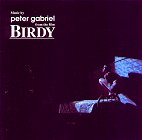 Since this movie soundtrack is constructed out of instrumental versions of material from the third Peter Gabriel album and Security, it may seem like a redundant purchase, but there are several new tracks, and even the familiar tunes are interesting to hear without the words (especially – go ahead and yawn here if you like – an instrumental version of “Rhythm Of The Heat”). Probably the best track here is “Birdy’s Flight”, which is essentially a long, somber intro and then the pulse-pounding
Since this movie soundtrack is constructed out of instrumental versions of material from the third Peter Gabriel album and Security, it may seem like a redundant purchase, but there are several new tracks, and even the familiar tunes are interesting to hear without the words (especially – go ahead and yawn here if you like – an instrumental version of “Rhythm Of The Heat”). Probably the best track here is “Birdy’s Flight”, which is essentially a long, somber intro and then the pulse-pounding  ending from the song “Not One Of Us”, and let me tell you, it’s quite a rush. Whew.
ending from the song “Not One Of Us”, and let me tell you, it’s quite a rush. Whew.
- At Night (2:38)
- Floating Dogs (2:55)
- Quiet and Alone (2:30)
- Close Up – derived from “Family Snapshot” (0:58)
- Slow Water (2:51)
Dressing the Wound (4:06)
- Birdy’s Flight – derived from “Not One Of Us” (2:58)
- Slow Marimbas (3:21)
- The Heat – derived from “Rhythm of the Heat” (4:41)
- Sketchpad with Trumpet and Voice (3:05)
- Under Lock and Key – derived from “Wallflower” (2:28)
- Powerhouse at the Foot of the Mountain – derived from “San Jacinto” (2:19)
Released by: Geffen
Release date: 1985
Total running time: 35:39
Man…Or Astroman? – Destroy All Astromen!
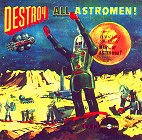 A bizarre retro-explosion of surf rock stylings, I’ll cop to the fact that this CD’s presence in my collection is primarily due to the Love Theme From Mystery Science Theater 3000. Some of this album’s tunes are really, really strange, dovetailing with the 50s B-movie poster album cover by including some incredibly obscure B-movie soundbytes, some of which I suspect are the band’s own invention rather than actual movie clips. (In that context, the MST theme is utterly appropriate.)
A bizarre retro-explosion of surf rock stylings, I’ll cop to the fact that this CD’s presence in my collection is primarily due to the Love Theme From Mystery Science Theater 3000. Some of this album’s tunes are really, really strange, dovetailing with the 50s B-movie poster album cover by including some incredibly obscure B-movie soundbytes, some of which I suspect are the band’s own invention rather than actual movie clips. (In that context, the MST theme is utterly appropriate.)
- Reverb 10,000 (2:09)
- Name of Numbers (1:32)
- Popcorn Crabula (1:57)
- A Mouthful of Exhaust (1:57)
- Of Sex and Demise (1:59)
- Joker’s Wild (2:17)
- Intoxica (1:38)
Mystery Meat (2:39)
- The Heavies (1:42)
- Madness in the Streets (1:40)
- Espanto del Future (1:57)
- Mystery Science Theater 3000 Love Theme (1:20)
- Landlocked (1:43)
- Bombora (2:04)
- Gargantua’s Last Stand (2:23)
- You Can’t Get Good Riblets In Space (0:47)
- Bermuda Triangle Shorts (2:14)
- Taco Wagon (2:03)
- The Vortex Beyond (2:18)
- Destination Venus (3:00)
- Time Bomb (6:10)
Released by: Estrus
Release date: 1994
Total running time: 45:31

Nixon – music by John Williams
 It’s appropriate enough that the controversial Oliver Stone would call upon John Williams to underscore the director’s newest retelling of a deceased American President’s life story. Where Williams’ treatment of JFK seemed experimental, electronic and appropriately unsettling, his take on the life of Richard Nixon (as told by Stone) seems much more serene and traditional in comparison. There’s also some outstanding solo trumpet work. Interestingly, two tracks actually do bear a strong resemblance to Williams’ JFK soundtrack, one being a recap of the decade leading up to Nixon’s presidency (which includes 1963), the other piece accompanying the Watergate
It’s appropriate enough that the controversial Oliver Stone would call upon John Williams to underscore the director’s newest retelling of a deceased American President’s life story. Where Williams’ treatment of JFK seemed experimental, electronic and appropriately unsettling, his take on the life of Richard Nixon (as told by Stone) seems much more serene and traditional in comparison. There’s also some outstanding solo trumpet work. Interestingly, two tracks actually do bear a strong resemblance to Williams’ JFK soundtrack, one being a recap of the decade leading up to Nixon’s presidency (which includes 1963), the other piece accompanying the Watergate  break-in itself. And somewhat more pleasingly, the Nixon soundtrack contains only one non-original piece – a brief statement of the “Battle Hymn of the Republic” – and the rest of the album consists of the movie’s score (as opposed to JFK‘s 1960s hit parade). Highly recommended, and the best Williams movie score in years.
break-in itself. And somewhat more pleasingly, the Nixon soundtrack contains only one non-original piece – a brief statement of the “Battle Hymn of the Republic” – and the rest of the album consists of the movie’s score (as opposed to JFK‘s 1960s hit parade). Highly recommended, and the best Williams movie score in years.
- The 1960s: The Turbulent Years (5:04)
- Main Title…the White House Gate (4:17)
- Growing Up In Whittier (2:42)
- The Ellsberg Break-In and Watergate (2:43)
- Love Field: Dallas, November 1963 (4:51)
- Losing a Brother (3:18)
- The Battle Hymn of the Republic (1:03)
- Making a Comeback (2:20)
- Track 2 and the Bay of Pigs (4:47)
- The Miami Convention: 1968 (3:19)
- The Meeting with Mao (3:09)
- “I Am That Sacrifice” (4:49)
- The Farewell Scene (5:01)
Released by: Hollywood Records
Release date: 1995
Total running time: 68:13
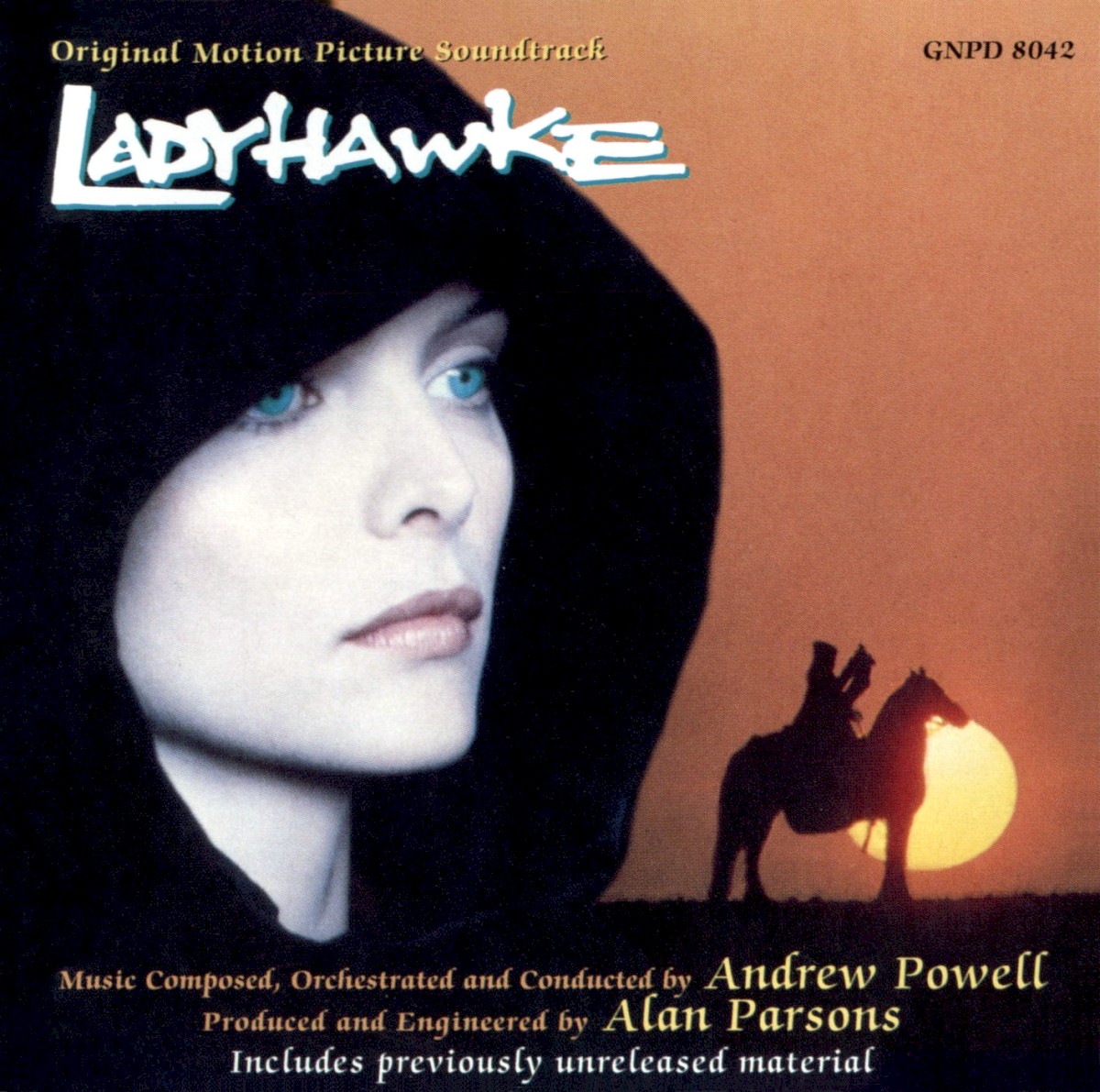
Ladyhawke – music by Andrew Powell
 An atypically anachronistic score for a medieval-fantasy movie, this album was composed by Andrew Powell, longtime orchestra arranger/conductor for Alan Parsons. Which brings us to why I even sought this album out, not having seen the movie – Parsons produced the soundtrack album, and the band which comprised the core of Parsons’ Project circa 1984 or so is prominently featured on many tracks. So it’s no exaggeration to say that this album sounds like a missing page from the Alan Parsons catalog, and in many cases the music was inspired by earlier Project instrumentals. Ladyhawke director Richard Donner listened to Alan Parsons Project albums all during the production of the movie, and had several specific requests and suggestions regarding the film’s music, based on existing Project pieces such as Powell’s long “Fall Of The House Of Usher” orchestral suite from Parsons’ first album, among others, so the resemblance is no mere coincidence. The Project rhythm section is, as always, incredibly precise and intricate, and the music would sound perfectly natural played next to
An atypically anachronistic score for a medieval-fantasy movie, this album was composed by Andrew Powell, longtime orchestra arranger/conductor for Alan Parsons. Which brings us to why I even sought this album out, not having seen the movie – Parsons produced the soundtrack album, and the band which comprised the core of Parsons’ Project circa 1984 or so is prominently featured on many tracks. So it’s no exaggeration to say that this album sounds like a missing page from the Alan Parsons catalog, and in many cases the music was inspired by earlier Project instrumentals. Ladyhawke director Richard Donner listened to Alan Parsons Project albums all during the production of the movie, and had several specific requests and suggestions regarding the film’s music, based on existing Project pieces such as Powell’s long “Fall Of The House Of Usher” orchestral suite from Parsons’ first album, among others, so the resemblance is no mere coincidence. The Project rhythm section is, as always, incredibly precise and intricate, and the music would sound perfectly natural played next to  anything from Parsons’ Vulture Culture or Stereotomy. I like this album a lot, because it combines some nice – if occasionally predictable – orchestral passages with the signature Parsons sound, but I’d really only recommend it to diehard Parsons fans, or diehard fans of this movie in particular.
anything from Parsons’ Vulture Culture or Stereotomy. I like this album a lot, because it combines some nice – if occasionally predictable – orchestral passages with the signature Parsons sound, but I’d really only recommend it to diehard Parsons fans, or diehard fans of this movie in particular.
- Main Title (2:59)
- Philippe’s Escape (1:40)
- The Search for Philippe (3:25)
- Tavern Fight – Philippe (2:08)
- Tavern Fight – Navarre (2:38)
- Pitou’s Woods (4:04)
- Philippe Describes Isabeau (1:11)
- Bishop’s Procession (2:50)
- Wedding Music (1:41)
- Navarre’s Ambush (4:53)
- Imperius Removes Arrow (1:33)
- The Chase / The Fall / Transformation – album version (2:06)
- Cezar’s Wood (5:29)
- She Was Sad At First (2:06)
- Navarre Returns to Aquila (1:36)
- Turret Chase / The Fall – film version (2:46)
- Wolf Trapped in Ice (2:34)
- Navarre and Isabeau’s Dual Transformation (3:23)
- Navarre and Marquet Duel (4:22)
- Marquet’s Death (1:59)
- Bishop’s Death (2:26)
- Final Reunion / End Title (8:14)
- Ladyhawke Theme – single version (3:35)
Released by: GNP Crescendo
Release date: 1985 (issued on CD in 1996)
Total running time: 70:06
The Move – Looking On
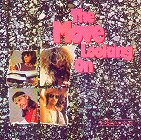 This is the first Move album to feature new member Jeff Lynne, who, with Roy Wood, mutated the Move into the first incarnation of ELO…and the rest, one could say, is history. If one can say that, then this album is history in the making, because it’s easy to hear Jeff Lynne’s style of songwriting emerging confidently, and as I’ve noted before with the first ELO album (which was the only one to feature Roy Wood), the combination of Lynne’s Beatle-ish songwriting practices and Wood’s fondness for eclectic instruments makes for a very unique sound. This is heard most clearly in “Open Up Said The World At The Door”, which is
This is the first Move album to feature new member Jeff Lynne, who, with Roy Wood, mutated the Move into the first incarnation of ELO…and the rest, one could say, is history. If one can say that, then this album is history in the making, because it’s easy to hear Jeff Lynne’s style of songwriting emerging confidently, and as I’ve noted before with the first ELO album (which was the only one to feature Roy Wood), the combination of Lynne’s Beatle-ish songwriting practices and Wood’s fondness for eclectic instruments makes for a very unique sound. This is heard most clearly in “Open Up Said The World At The Door”, which is  clearly a Lynne tune with all of its harmonies, but twice in the course of the song breaks into a sitar solo and then an oboe solo – obvious Wood contributions. In a way, despite later Move albums that featured such classics as “Do Ya” which was covered afterward by ELO, this is the closest the Move ever got to the ELO sound, and it’s worth a listen or two.
clearly a Lynne tune with all of its harmonies, but twice in the course of the song breaks into a sitar solo and then an oboe solo – obvious Wood contributions. In a way, despite later Move albums that featured such classics as “Do Ya” which was covered afterward by ELO, this is the closest the Move ever got to the ELO sound, and it’s worth a listen or two.
- Looking On (7:48)
- Turkish Tram Conductor Blues (4:38)
- What? (6:42)
- When Alice Comes Back to the Farm (3:40)
- Open Up Said the World at the Door (7:10)
- Brontosaurus (4:26)
- Feel Too Good (9:30)
- Blackberry Way (3:41)
- Something (3:11)
- Curly (2:44)
- This Time Tomorrow (3:40)
- Lightning Never Strikes Twice (3:12)
Released by: Cube / Repertoire
Release date: 1970
Total running time: 60:22
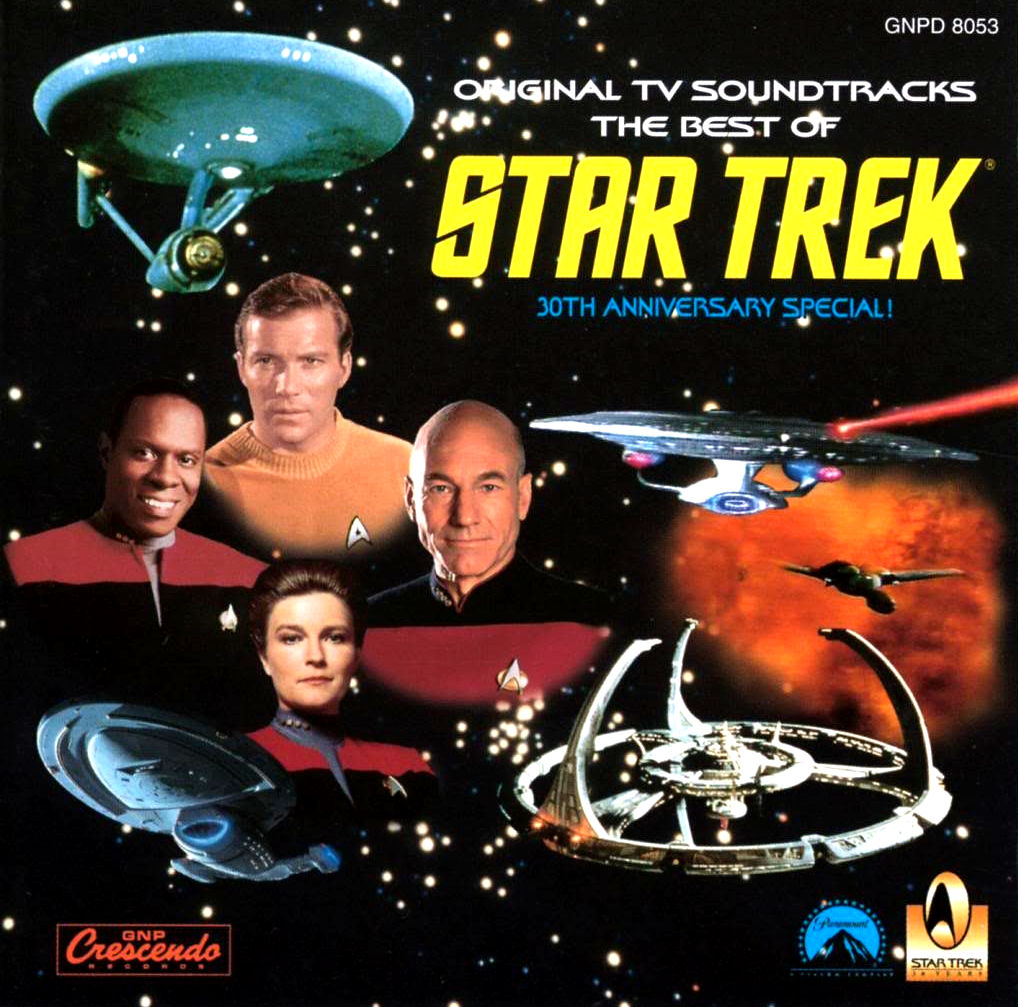
The Best Of Star Trek, Volume One
 Released simultaneously with the Star Trek: First Contact soundtrack, this disc is a sort of stellar sampler, with music from at least one episode of each of the Star Trek series. Representing the original series, and again beautifully remastered as was the case with GNP Crescendo’s second and third albums of original Trek music, are the Alexander Courage signature theme and several minutes of whimsical music from 1967’s all-time-favorite The Trouble With Tribbles. The sound quality is so clear that it’s hard to believe these sessions were recorded three decades ago. Star Trek: The Next Generation gets a double dose of episodic scores after its own rendition of the combined themes of Courage and Jerry Goldsmith. First up is a synthesizer-heavy and action-packed selection of music from 1988’s Heart Of Glory, in which future Best Of Both Worlds composer Ron Jones flexes his melodic muscle in a way that future Trek music makers would not get to enjoy for a long time. Then, the very popular flute-solo theme from 1992’s Inner Light episode is given a lavish, never-before-heard treatment with an orchestral backing, a kind of solo concerto waltz with the flute in the audio foreground. Jay Chattaway’s other music from that episode is not reflected in this piece, but the sheer beauty of it is more than satisfying. Dennis McCarthy then strikes up a more percussive revival of the Deep Space Nine theme, even more rhythmic than the current version on which it is based, and then continues with cues from the sentimental and well-loved episode The Visitor. Then, the terrible edit version of Goldsmith’s Voyager theme – the same version which appeared on the Voyager CD single – introduces the Voyager portion of the album. McCarthy more than makes up for the horribly edited theme with his boisterous, heraldic music from the Viking-influenced story Heroes And Demons. This is an album from which Trek fans should find at least one piece of music to love, either in the more recent material’s
Released simultaneously with the Star Trek: First Contact soundtrack, this disc is a sort of stellar sampler, with music from at least one episode of each of the Star Trek series. Representing the original series, and again beautifully remastered as was the case with GNP Crescendo’s second and third albums of original Trek music, are the Alexander Courage signature theme and several minutes of whimsical music from 1967’s all-time-favorite The Trouble With Tribbles. The sound quality is so clear that it’s hard to believe these sessions were recorded three decades ago. Star Trek: The Next Generation gets a double dose of episodic scores after its own rendition of the combined themes of Courage and Jerry Goldsmith. First up is a synthesizer-heavy and action-packed selection of music from 1988’s Heart Of Glory, in which future Best Of Both Worlds composer Ron Jones flexes his melodic muscle in a way that future Trek music makers would not get to enjoy for a long time. Then, the very popular flute-solo theme from 1992’s Inner Light episode is given a lavish, never-before-heard treatment with an orchestral backing, a kind of solo concerto waltz with the flute in the audio foreground. Jay Chattaway’s other music from that episode is not reflected in this piece, but the sheer beauty of it is more than satisfying. Dennis McCarthy then strikes up a more percussive revival of the Deep Space Nine theme, even more rhythmic than the current version on which it is based, and then continues with cues from the sentimental and well-loved episode The Visitor. Then, the terrible edit version of Goldsmith’s Voyager theme – the same version which appeared on the Voyager CD single – introduces the Voyager portion of the album. McCarthy more than makes up for the horribly edited theme with his boisterous, heraldic music from the Viking-influenced story Heroes And Demons. This is an album from which Trek fans should find at least one piece of music to love, either in the more recent material’s  subtle textures or the action cues from the original Trek and early Next Generation. There is not a refrigerator magnet with this disc, sorry. I’d buy most any album of Star Trek scores, but the chance to hear yet again the remastered music of the original series and some belligerent Ron Jones action cues is enough for me to recommend this one.
subtle textures or the action cues from the original Trek and early Next Generation. There is not a refrigerator magnet with this disc, sorry. I’d buy most any album of Star Trek scores, but the chance to hear yet again the remastered music of the original series and some belligerent Ron Jones action cues is enough for me to recommend this one.
- Star Trek original series main title by Alexander Courage (1:03)
Suite from Star Trek – The Trouble With Tribbles by Jerry Fielding:- Bartender Bit / They Quibble Over Quibble / Kirk Out / Barrel of Trouble /
Tribble Hooks Kirk / Poor Jonesey / A Matter of Pride (5:19)- The Muzak Maker / The Scherzo Maker (1:37)
- A Matter of Pride / No Tribble At All / Big Fight (4:05)
- Star Trek: The Next Generation main title (1:49)
Suite from Star Trek: The Next Generation – Heart of Glory by Ron Jones:- Moment of Decision / Battle Signs / Geordi Vision / Lookin for Life Signs /
Imminent Destruction (8:29)- A Klingon’s Feelings / Let’s Make a Phaser / Heart of Glory (6:30)
- Orchestral suite from Star Trek: The Next Generation – The Inner Light by Jay Chattaway (6:36)
- Star Trek: Deep Space Nine main title – 4th season version (1:55)
Suite from Star Trek: Deep Space Nine – The Visitor by Dennis McCarthy:- Rainy Night (1:08)
- Steve O’s Cue / Freaked Out (3:07)
- Dad Admonishes (3:12)
- One Last Visit (2:58)
- Second Chance (1:14)
- Star Trek: Voyager main title (extended edit)
by Jerry Goldsmith (2:22)
Suite from Star Trek: Voyager – Heroes & Demons by Dennis McCarthy:- Last Hope (2:32)
- Dr. Schweitzer (1:20)
- Armagonnen (1:48)
- Where’s Freya / To The Rescue (6:45)
Released by: GNP Crescendo
Release date: 1996
Total running time: 63:51
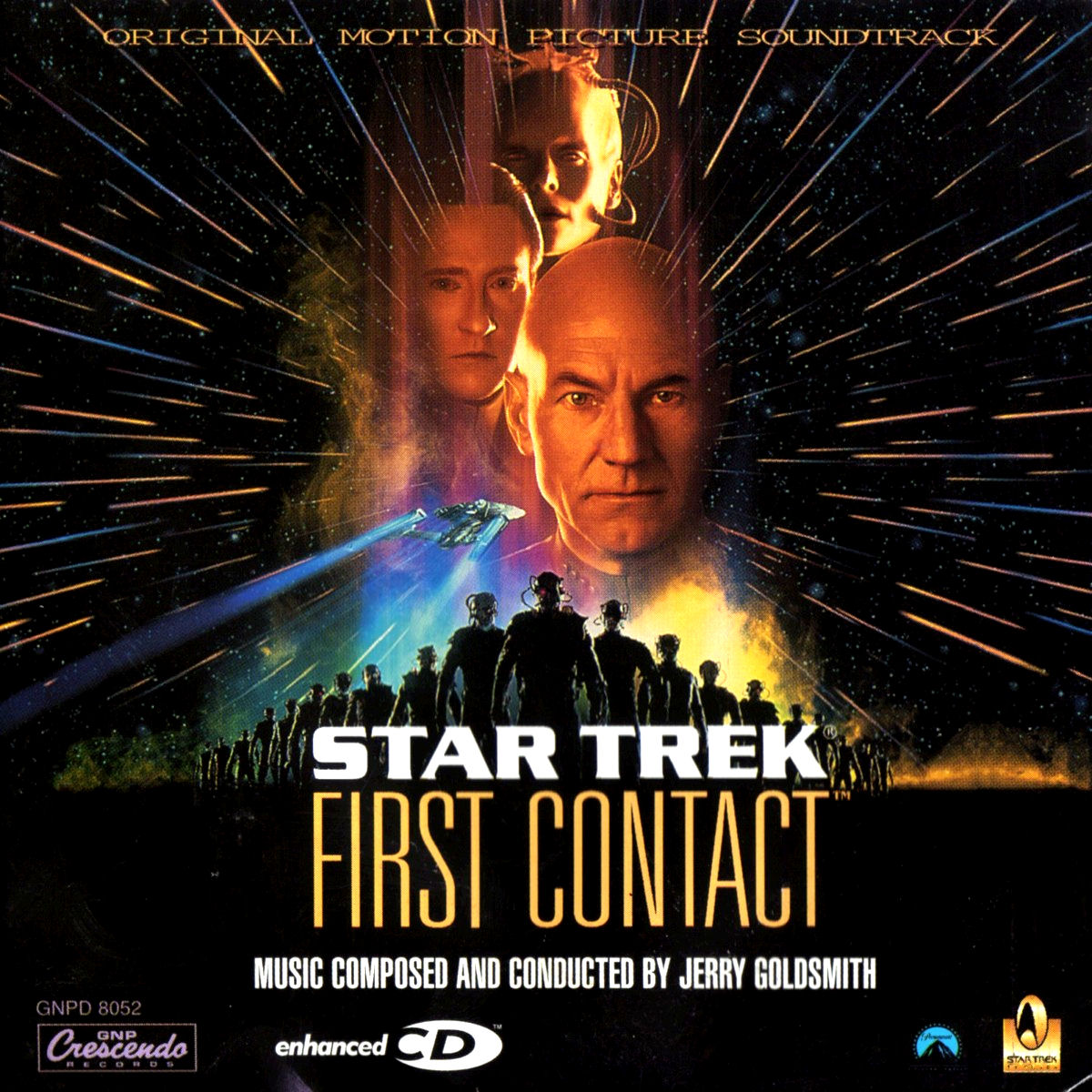
Star Trek: First Contact
 Honestly, my first impressions of the music from First Contact were less than favorable, but I realize now that this came from how poorly the score was mixed into the rest of the movie’s sound. I have to remind myself that the producer of the current Trek movies and TV series is Rick Berman, who seems as likely to have the bleeping, roaring, atmospheric sound effects on top of the mix as he is to put the music there. Berman, preparing to produce his second Trek feature, chose Goldsmith to score it, and may have been displeased with how prominent a sound the acclaimed composer can deliver. Even if you’ve seen First Contact ten times, you haven’t heard the music, because it’s hardly even present in the film’s sound mix. Tagging along with dad is son Joel Goldsmith, who demostrates that he can actually do better than the infamous Star Trek: Voyager theme CD single by providing some percussive Borg cues firmly based in the musical tradition of horror movies. Even though the elder Goldsmith slavishly quotes his own Star Trek: The Motion Picture theme, some small motifs, and most ridiculous and annoying of all, the Klingon theme (now heard whenever Worf walks into the frame), he introduces several fascinating new thematic elements, including metallic percussion and the famous “Blaster Beam” sound not heard since Star Trek II for the Borg, as well as an alternately reverent and wistful theme
Honestly, my first impressions of the music from First Contact were less than favorable, but I realize now that this came from how poorly the score was mixed into the rest of the movie’s sound. I have to remind myself that the producer of the current Trek movies and TV series is Rick Berman, who seems as likely to have the bleeping, roaring, atmospheric sound effects on top of the mix as he is to put the music there. Berman, preparing to produce his second Trek feature, chose Goldsmith to score it, and may have been displeased with how prominent a sound the acclaimed composer can deliver. Even if you’ve seen First Contact ten times, you haven’t heard the music, because it’s hardly even present in the film’s sound mix. Tagging along with dad is son Joel Goldsmith, who demostrates that he can actually do better than the infamous Star Trek: Voyager theme CD single by providing some percussive Borg cues firmly based in the musical tradition of horror movies. Even though the elder Goldsmith slavishly quotes his own Star Trek: The Motion Picture theme, some small motifs, and most ridiculous and annoying of all, the Klingon theme (now heard whenever Worf walks into the frame), he introduces several fascinating new thematic elements, including metallic percussion and the famous “Blaster Beam” sound not heard since Star Trek II for the Borg, as well as an alternately reverent and wistful theme  for the movie’s first contact between mankind and aliens. Even if you, like me, were unimpressed with the music in the movie, fear not – because you weren’t given a fair chance to hear it. This album offers a chance to hear the music without dialogue and sound effects, and a chance to add to your collection of refrigerator magnets as well. (You probably think I’m joking, don’t you?)
for the movie’s first contact between mankind and aliens. Even if you, like me, were unimpressed with the music in the movie, fear not – because you weren’t given a fair chance to hear it. This album offers a chance to hear the music without dialogue and sound effects, and a chance to add to your collection of refrigerator magnets as well. (You probably think I’m joking, don’t you?)
- Main Title / Locutus (4:17)
- Red Alert (2:13)
- Temporal Wake (2:07)
- Welcome Aboard (2:40)
- Fully Functional (3:18)
- Retreat (3:59)
- Evacuate (2:19)
- 39.1 Degrees Celcius (4:44)
- The Dish (7:05)
- First Contact (5:52)
- End Credits (5:24)
Featured songs:
- Magic Carpet Ride – performed by Steppenwolf (4:25)
- Ooby Dooby – performed by Roy Orbison (2:08)
Released by: GNP Crescendo
Release date: 1996
Total running time: 40:31
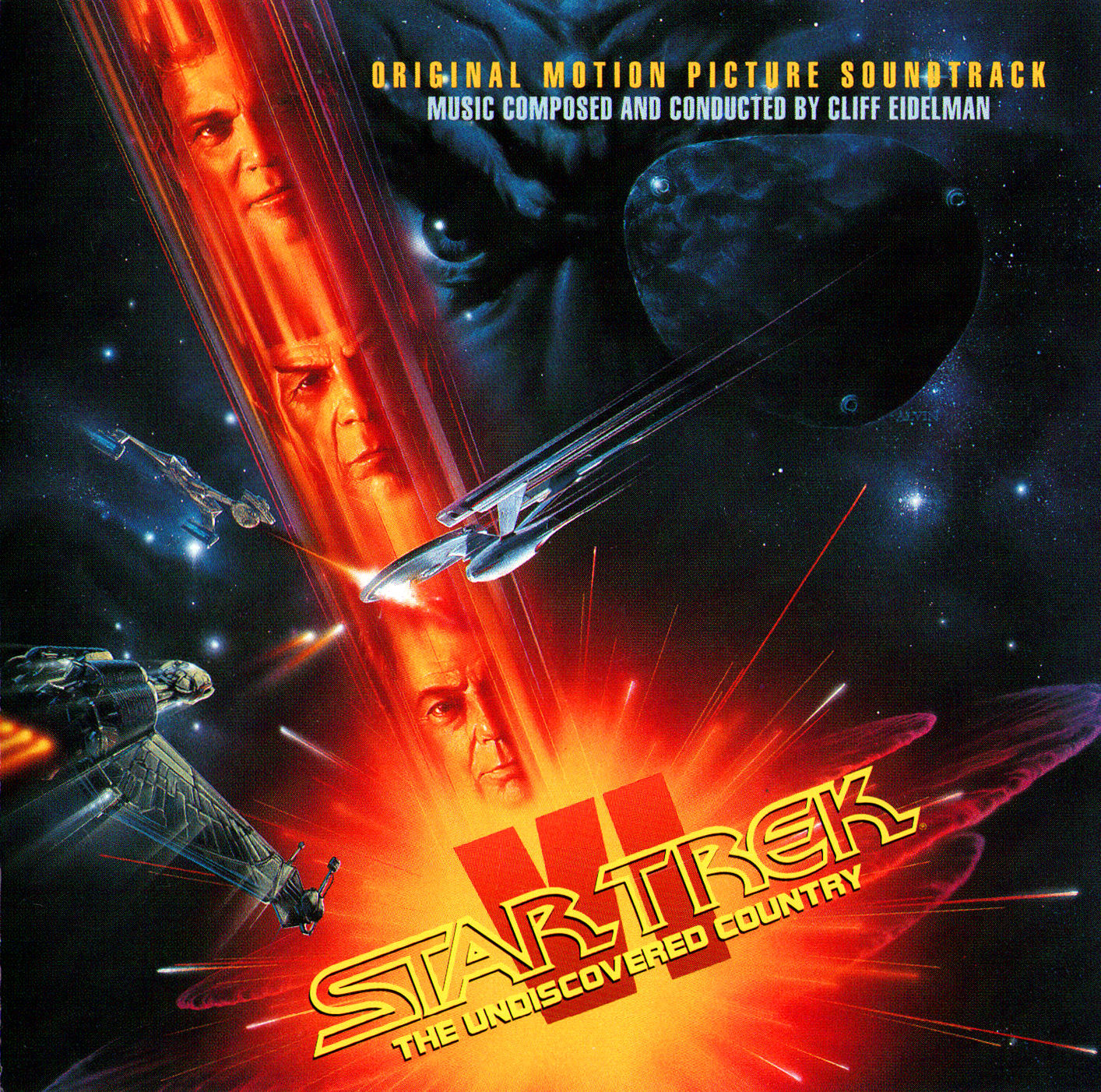
Star Trek VI: The Undiscovered Country
 I’m always happy when a Star Trek movie comes along and breaks free of traditional or overused treatments. James Horner, in two Trek movie outings, recycled the same handful of themes over and over (somewhat excusable, since the second and third films in the Trek catalogue were very closely intertwined); Jerry Goldsmith reiterated his famous Star Trek: The Motion Picture theme in no less than three movie projects (and we won’t get into how tired that theme got after seven years on TV with Star Trek: The Next Generation). So when someone comes along and completely sheds all nods to previous Trekkie fare – though Eidelman and later Dennis McCarthy made brief quotes of Alexander Courage’s themes in their respective scores – I’m all for it. The sixth Trek movie is graced by a dark, rumbling, near-operatic reminder of menace, extremely appropriate for the movie’s events which threaten to break down into certain doom for all involved. Some listeners and
I’m always happy when a Star Trek movie comes along and breaks free of traditional or overused treatments. James Horner, in two Trek movie outings, recycled the same handful of themes over and over (somewhat excusable, since the second and third films in the Trek catalogue were very closely intertwined); Jerry Goldsmith reiterated his famous Star Trek: The Motion Picture theme in no less than three movie projects (and we won’t get into how tired that theme got after seven years on TV with Star Trek: The Next Generation). So when someone comes along and completely sheds all nods to previous Trekkie fare – though Eidelman and later Dennis McCarthy made brief quotes of Alexander Courage’s themes in their respective scores – I’m all for it. The sixth Trek movie is graced by a dark, rumbling, near-operatic reminder of menace, extremely appropriate for the movie’s events which threaten to break down into certain doom for all involved. Some listeners and  moviegoers – particularly those fans who are far too set in their ways – couldn’t grasp this very different musical treatment of what seems to be everyone’s favorite fictional universe at the time, but I still encourage anyone interested to go and give this one a second listen.
moviegoers – particularly those fans who are far too set in their ways – couldn’t grasp this very different musical treatment of what seems to be everyone’s favorite fictional universe at the time, but I still encourage anyone interested to go and give this one a second listen.
- Overture (2:57)
- An Incident (0:53)
- Clear All Moorings (1:39)
- Assassination (4:45)
- Surrender for Peace (2:46)
- Death of Gorkon (1:10)
- Rura Penthe (4:22)
- Revealed (2:38)
- Escape From Rura Penthe (5:34)
- Dining on Ashes (1:00)
- The Battle for Peace (8:03)
- Sign Off (3:13)
- Star Trek VI Suite (6:18)
Released by: MCA
Release date: 1991
Total running time: 45:18
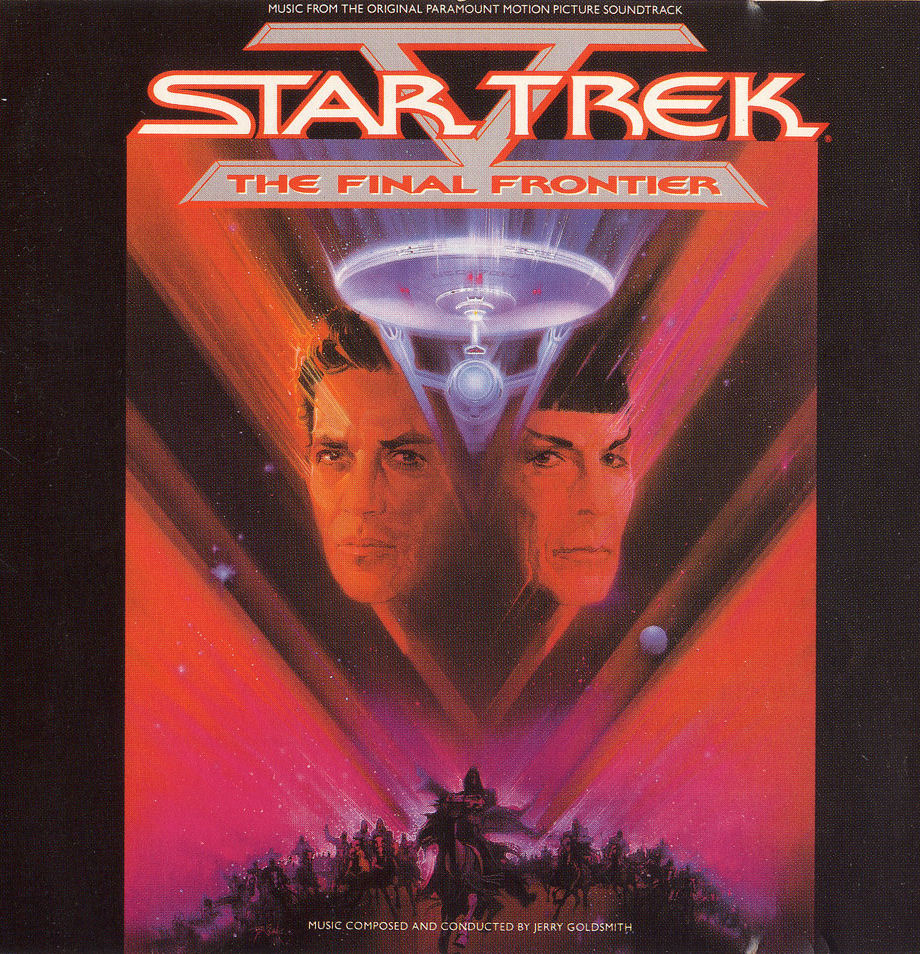
Star Trek V: The Final Frontier
 Many people thought that the first Star Trek movie was a bad film which was saved by an incredible musical score. The first Star Trek movie was not a bad film. This, however, was. And perhaps fully conscious of this, the producers of Star Trek V opted to bring Jerry Goldsmith back to the Trek fold to score William “Captain Kirk” Shatner’s first foray into feature directing. Goldsmith himself didn’t exactly reinvent the wheel. His second Trek movie score rehashes the main theme and the Klingon signature tune from Star Trek: The Motion Picture, and the original music that was composed specifically for this movie just doesn’t seem to be up to the standard of Goldsmith’s previous outing. (Maybe he lacked inspiration from the source material. I’d buy that explanation.) Some of the more tranquil passages are certainly up to a few
Many people thought that the first Star Trek movie was a bad film which was saved by an incredible musical score. The first Star Trek movie was not a bad film. This, however, was. And perhaps fully conscious of this, the producers of Star Trek V opted to bring Jerry Goldsmith back to the Trek fold to score William “Captain Kirk” Shatner’s first foray into feature directing. Goldsmith himself didn’t exactly reinvent the wheel. His second Trek movie score rehashes the main theme and the Klingon signature tune from Star Trek: The Motion Picture, and the original music that was composed specifically for this movie just doesn’t seem to be up to the standard of Goldsmith’s previous outing. (Maybe he lacked inspiration from the source material. I’d buy that explanation.) Some of the more tranquil passages are certainly up to a few  listens, including the movie’s opening scenes of Kirk scaling a mountain, and some ethereal music to accompany the initially benign appearance of a being that purports to be God. And the album is ended by a tune from Hiroshima, which was performed briefly – though not by Hiroshima – in the film.
listens, including the movie’s opening scenes of Kirk scaling a mountain, and some ethereal music to accompany the initially benign appearance of a being that purports to be God. And the album is ended by a tune from Hiroshima, which was performed briefly – though not by Hiroshima – in the film.
- The Mountain (3:53)
- The Barrier (2:54)
- Without Help (4:21)
- A Busy Man (4:42)
- Open the Gates (3:03)
- An Angry God (6:58)
- Let’s Get Out Of Here (5:15)
- Free Minds (3:20)
- Life is a Dream – end title (3:59)
- The Moon’s a Window to Heaven – performed by Hiroshima (4:00)
Released by: Epic
Release date: 1989
Total running time: 42:25
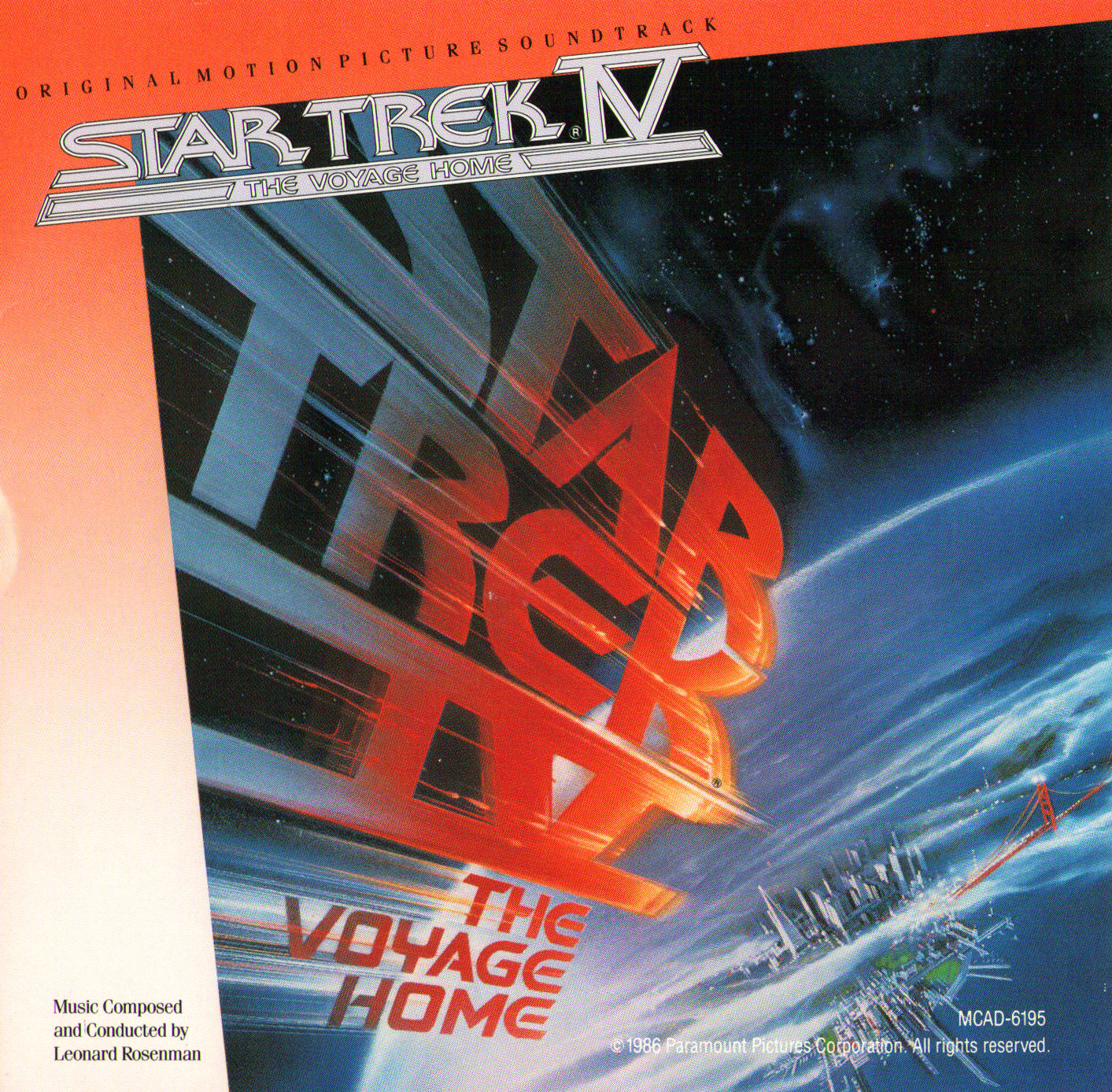
Star Trek IV: The Voyage Home
 You know, it seems like a lot of people, particularly die-hard Star Trek fans, have a great distaste for this soundtrack album from the fourth (and arguably most popular) movie, but I’ve always had a soft spot for it. As you may have read in my critiques of the movie scores by Dennis McCarthy and Cliff Eidelman, I like it when a Star Trek movie’s musical sound isn’t just a repetition of previous scores, but has something new to say. I will be the first to admit that this movie, in venturing into 1986 San Francisco, made it easy going on the composer by allowing him to come up with contemporary, less orchestral music, but the tidbits of movie score that are present on the Star Trek IV soundtrack aren’t bad at all. From the more-celebratory-than-usual opening title (which plays almost like a Christmas carol) to some more menacing cues to accompany things like time travel and Earth-destroying alien ships, there really
You know, it seems like a lot of people, particularly die-hard Star Trek fans, have a great distaste for this soundtrack album from the fourth (and arguably most popular) movie, but I’ve always had a soft spot for it. As you may have read in my critiques of the movie scores by Dennis McCarthy and Cliff Eidelman, I like it when a Star Trek movie’s musical sound isn’t just a repetition of previous scores, but has something new to say. I will be the first to admit that this movie, in venturing into 1986 San Francisco, made it easy going on the composer by allowing him to come up with contemporary, less orchestral music, but the tidbits of movie score that are present on the Star Trek IV soundtrack aren’t bad at all. From the more-celebratory-than-usual opening title (which plays almost like a Christmas carol) to some more menacing cues to accompany things like time travel and Earth-destroying alien ships, there really  is no decline in quality compared to other Trek films where the music is concerned. And even the fusion jazz source music cues are good, performed by the Yellowjackets, a small jazz ensemble. For those fans put off by the lighthearted sound of this score, I can only say it’s not bad at all.
is no decline in quality compared to other Trek films where the music is concerned. And even the fusion jazz source music cues are good, performed by the Yellowjackets, a small jazz ensemble. For those fans put off by the lighthearted sound of this score, I can only say it’s not bad at all.
- Main Title (2:39)
- The Whaler (2:00)
- Market Street (4:39)
- Crash-Whale Fugue (8:15)
- Ballad of the Whale (5:03)
- Gillian Seeks Kirk (2:42)
- Chekov’s Run (1:19)
- Time Travel (1:29)
- Hospital Chase (1:13)
- The Probe (1:17)
- Home Again / End Credits (5:40)
Released by: MCA
Release date: 1986
Total running time: 36:16
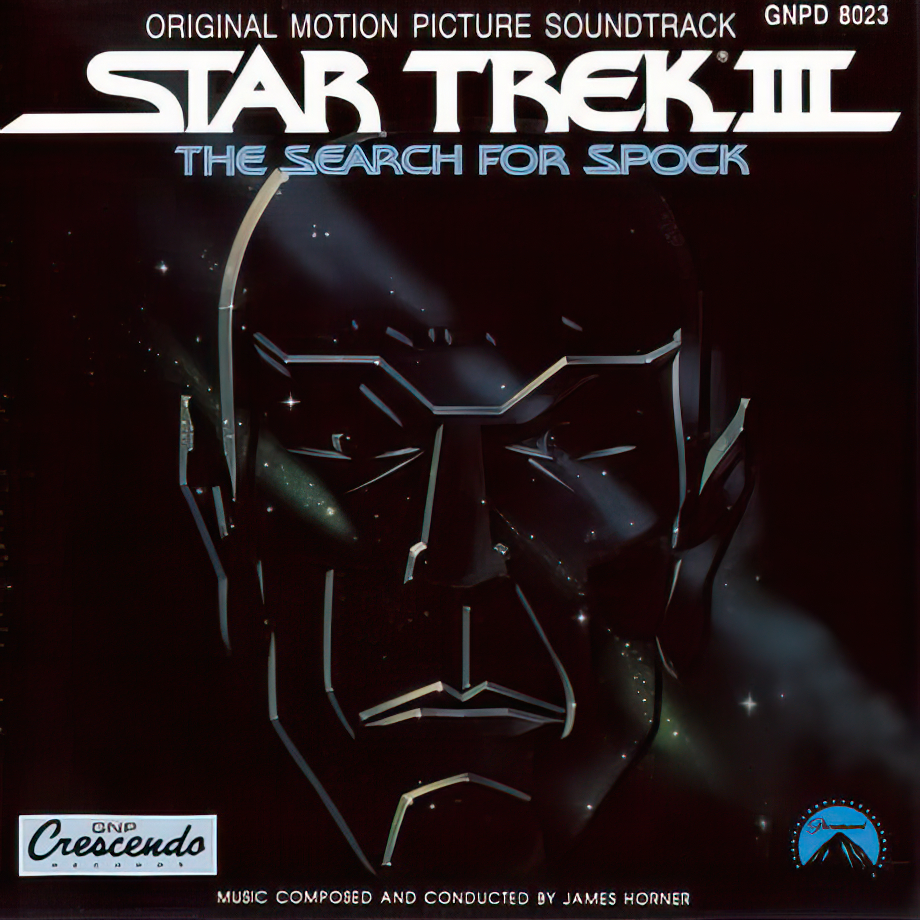
Star Trek III: The Search for Spock
 I praise Horner for his Star Trek II soundtrack, but I have to take issue with how he managed to score the next movie. A lot of the music – indeed, starting with the opening titles – is simply lifted from Star Trek II. Now, to some degree, this is understandable, as Trek III picked up directly where its predecessor left off and quite a bit of continuity is to be expected, but there are places where you’d swear the film was being tracked with music from Star Trek II. There are exceptions to this rule – Horner created a different musical vision of the Klingons than Goldsmith’s popular theme, and there are some
I praise Horner for his Star Trek II soundtrack, but I have to take issue with how he managed to score the next movie. A lot of the music – indeed, starting with the opening titles – is simply lifted from Star Trek II. Now, to some degree, this is understandable, as Trek III picked up directly where its predecessor left off and quite a bit of continuity is to be expected, but there are places where you’d swear the film was being tracked with music from Star Trek II. There are exceptions to this rule – Horner created a different musical vision of the Klingons than Goldsmith’s popular theme, and there are some  interesting passages in the eight-and-a-half-minute “Stealing The Enterprise” cue. There’s another surprise in the form of a synth-pop rendition of the main theme, titled “The Search For Spock”, which is the first concession to a pop music audience that the Trek movie series made, but it wouldn’t be the last.
interesting passages in the eight-and-a-half-minute “Stealing The Enterprise” cue. There’s another surprise in the form of a synth-pop rendition of the main theme, titled “The Search For Spock”, which is the first concession to a pop music audience that the Trek movie series made, but it wouldn’t be the last.
- Prologue and Main Title (6:27)
- Klingons (5:55)
- Stealing the Enterprise (8:33)
- The Mind Meld (2:30)
- Bird of Prey Decloaks (3:37)
- Returning to Vulcan (4:49)
- The Katra Ritual (4:29)
- End Title (6:12)
- The Search for Spock (3:43)
Released by: GNP Crescendo
Release date: 1984
Total running time: 46:15
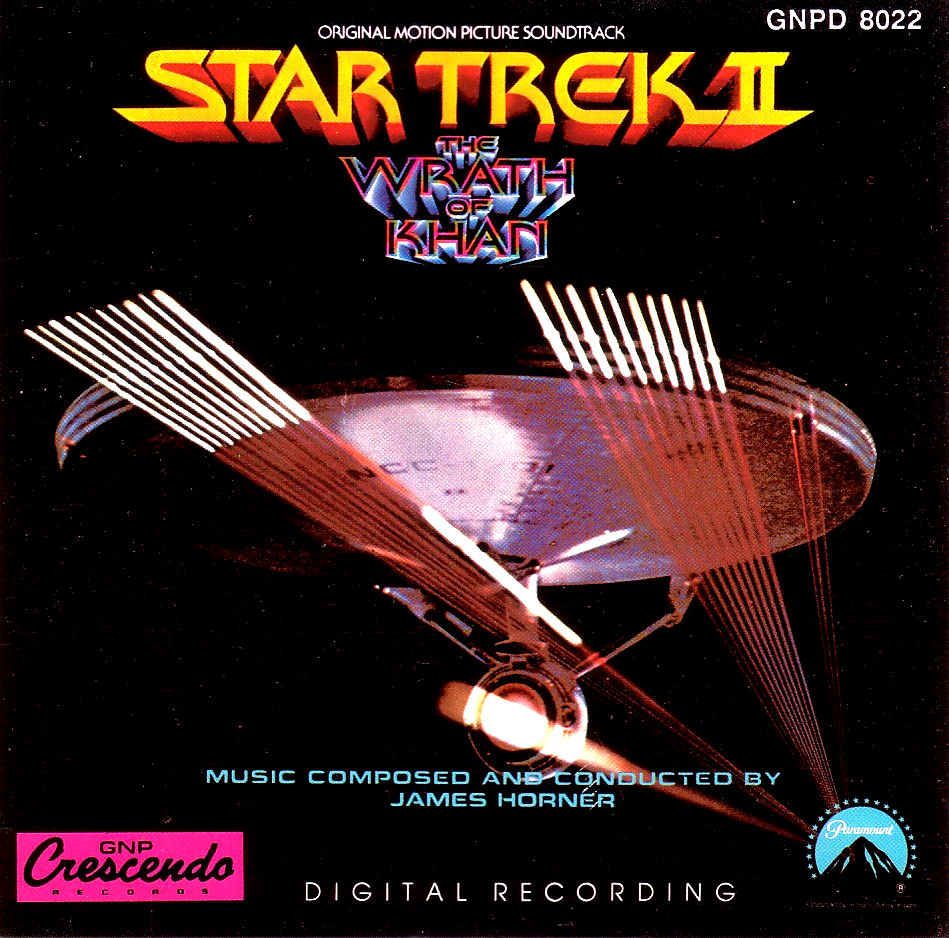
Star Trek II: The Wrath of Khan – music by James Horner
 This, along with Goldsmith’s music for Star Trek: The Motion Picture, seem to have entrenched themselves in the minds of the public and Trek fans alike as the definitive Star Trek movie scores…by virtue, I suspect, of having been the first two. There are lovely passages – and a beautiful main and closing theme – in this action-packed score, but in a few places the sound is just too thick and too boisterous, and it’s hard to keep up with it all. Still, it’s one of everyone’s favorite soundtracks, and it is good. It’s a much better entry than Horner gave us for the Star Trek movie that followed
This, along with Goldsmith’s music for Star Trek: The Motion Picture, seem to have entrenched themselves in the minds of the public and Trek fans alike as the definitive Star Trek movie scores…by virtue, I suspect, of having been the first two. There are lovely passages – and a beautiful main and closing theme – in this action-packed score, but in a few places the sound is just too thick and too boisterous, and it’s hard to keep up with it all. Still, it’s one of everyone’s favorite soundtracks, and it is good. It’s a much better entry than Horner gave us for the Star Trek movie that followed  this one. Also noteworthy was the use of that instrument/sound/thing called the Blaster Beam – a distinctive tone that distinguished the first two Trek films and then seemed to disappear completely until the eighth movie – in some new and different ways than it had appeared in Goldsmith’s score.
this one. Also noteworthy was the use of that instrument/sound/thing called the Blaster Beam – a distinctive tone that distinguished the first two Trek films and then seemed to disappear completely until the eighth movie – in some new and different ways than it had appeared in Goldsmith’s score.
- Main Title (3:03)
- Surprise Attack (5:06)
- Spock (1:10)
- Kirk’s Explosive Reply (4:02)
- Khan’s Pets (4:18)
- Enterprise Clears Moorings (3:32)
- Battle in the Mutara Nebula (8:08)
- Genesis Countdown (6:36)
- Epilogue / End Title (8:40)
Released by: GNP Crescendo
Release date: 1982
Total running time: 44:35
Roy Orbison – King Of Hearts
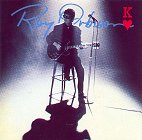 Where Mystery Girl succeeded in adding luster to Orbison’s posthumous legend, this album, despite a number of great songs, comes across as one too many trips to the well. Whether for the money or the publicity, this may have stretched it too far. The usually elegant production values associated with Jeff Lynne deteriorate to home demo standards with “I Drove All Night” and “Heartbreak Radio”, neither of which offers any glimpse of Lynne’s future skill in restoring deceased artists’ demo recordings. The best songs on King Of Hearts include “After The Love Has Gone”, “You’re The One” (featuring k.d. lang), and “We’ll Take The Night”, all of them as well-produced as anything from Mystery Girl. Perhaps better filler could have been found than another rendition of the previous
Where Mystery Girl succeeded in adding luster to Orbison’s posthumous legend, this album, despite a number of great songs, comes across as one too many trips to the well. Whether for the money or the publicity, this may have stretched it too far. The usually elegant production values associated with Jeff Lynne deteriorate to home demo standards with “I Drove All Night” and “Heartbreak Radio”, neither of which offers any glimpse of Lynne’s future skill in restoring deceased artists’ demo recordings. The best songs on King Of Hearts include “After The Love Has Gone”, “You’re The One” (featuring k.d. lang), and “We’ll Take The Night”, all of them as well-produced as anything from Mystery Girl. Perhaps better filler could have been found than another rendition of the previous  album’s “Careless Heart “which doesn’t differ enough from the original to merit much attention, though I welcomed the inclusion of an earlier duet recordimg of “Crying” with k.d. lang that had previously languished in the obscurity of the soundtrack of a Jon Cryer movie. I can recommend this album to dedicated followers of the late, great Roy Orbison, but honestly can’t advise casual listeners to seek it out.
album’s “Careless Heart “which doesn’t differ enough from the original to merit much attention, though I welcomed the inclusion of an earlier duet recordimg of “Crying” with k.d. lang that had previously languished in the obscurity of the soundtrack of a Jon Cryer movie. I can recommend this album to dedicated followers of the late, great Roy Orbison, but honestly can’t advise casual listeners to seek it out.
- You’re The One (2:59)
- Heartbreak Radio (2:57)
- We’ll Take The Night (4:55)
- Crying with k.d. lang (3:48)
- After The Love Has Gone (4:38)
- Love In Time (5:31)
- I Drove All Night (3:46)
- Wild Hearts Run Out Of Time (3:32)
- Coming Home (4:00)
- Careless Heart original demo (5:15)
Released by: Virgin
Release date: 1992
Total running time: 41:21
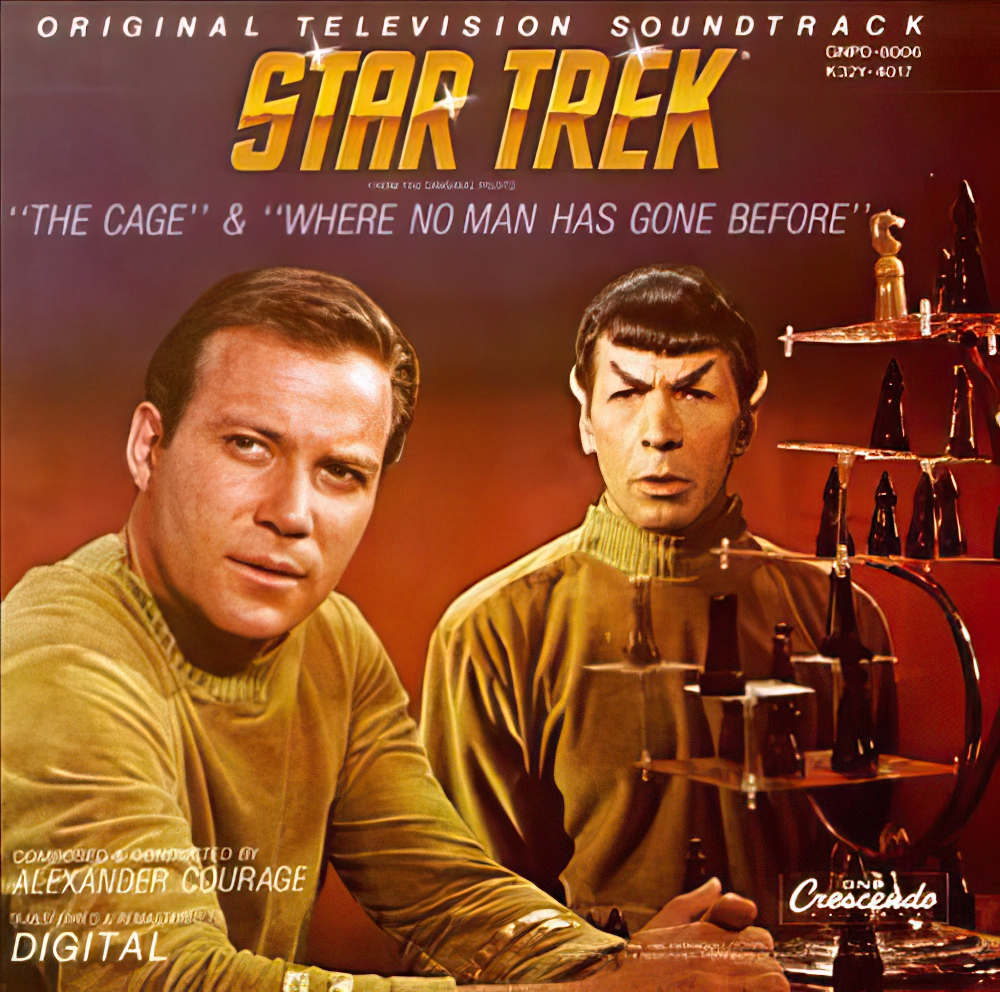
Star Trek: The Cage / Where No Man Has Gone Before
 I really wish Crescendo would go back, remaster this album and re-release it up to the standards of the more recent releases. The excellent music from the first two produced examples of 1960s Star Trek, as reproduced here, comes across as heavy on the treble frequencies and rather shrill. With some equalization, it makes good speaker listening, but it’s not headphone material. Still, the mysterious music from The Cage and the rather more typical action music for William Shatner’s debut as Kirk
I really wish Crescendo would go back, remaster this album and re-release it up to the standards of the more recent releases. The excellent music from the first two produced examples of 1960s Star Trek, as reproduced here, comes across as heavy on the treble frequencies and rather shrill. With some equalization, it makes good speaker listening, but it’s not headphone material. Still, the mysterious music from The Cage and the rather more typical action music for William Shatner’s debut as Kirk  in Where No Man Has Gone Before survives the test of time well. It just needs a little remastering.
in Where No Man Has Gone Before survives the test of time well. It just needs a little remastering.
The Cage
- Star Trek theme (0:50)
- Doctor Bartender (1:16)
- Survivors (1:37)
- Prime Specimen (3:08)
- Bottled (1:46)
- Probed (0:45)
- Monster Illusion (1:13)
- Monster Fight (1:37)
- The Kibitzers (0:36)
- Vena’s Punishment (1:44)
- Pike’s Punishment (0:33)
- Picnic (2:09)
- True Love (1:17)
- Vena’s Dance (1:49)
- Torchy Girl (0:12)
- Under the Spell (0:26)
- Primitive Thoughts (0:24)
- Wrong Think (0:40)
- To Catch a T. (1:19)
- Going Up (1:06)
- Max’s Factor (2:04)
- Star Trek end title (1:29)
Where No Man Has Gone Before
- Main Title (0:14)
- Star Date (0:34)
- Episode Titles (1:18)
- Force Field (2:17)
- Silvery Orbs (1:49)
- Crippled Ship (0:53)
- Speedy Reader (0:50)
- Hit the Button (0:03)
- On Delta-Vega (0:37)
- When Your Eyes Have Turned To Silver (0:58)
- Instant Paradise (2:50)
- End title and credits (0:21)
- Additional credits (0:20)
Released by: GNP Crescendo
Release date: 1986
Total running time: 41:04
Crowded House – Recurring Dream: The Very Best Of
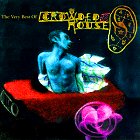 This bittersweet final album from the band that was the genesis of my fascination with Split Enz and the Finn Brothers is quite a collection; almost exactly like the Alan Parsons live album, I only got this one on the virtue of its three new tracks (don’t you hate it when they do that, and you’ve got to buy those other sixteen songs you’ve already heard…oh, never mind…), but I thought I’d comment on the selection of past tracks as well as the new songs. The three new tunes, “Not The Girl You Think You Are”, “Instinct” and “Everything Is Good For You”, are excellent, if somewhat atypical of the signature sound of Crowded House that fills out the rest of the album. They sound very much like they came from the Finn Brothers sessions, and a glance at the liner notes revealed that they were recorded in the same studio. All three also have a distinctly Beatlesque sound, especially “Not The Girl You Think You Are”. But that is by no means a fault – they’re still nifty new tunes. The remainder of the album has one of the best lineups of material I have ever seen on a compilation – truly the best of, including the singles “Don’t Dream It’s Over”, “Something So Strong” and “Better Be Home Soon” as well as the mesmerizing “Weather With You”, one of my favorites from 1991’s Woodface. Other personal faves of mine here are
This bittersweet final album from the band that was the genesis of my fascination with Split Enz and the Finn Brothers is quite a collection; almost exactly like the Alan Parsons live album, I only got this one on the virtue of its three new tracks (don’t you hate it when they do that, and you’ve got to buy those other sixteen songs you’ve already heard…oh, never mind…), but I thought I’d comment on the selection of past tracks as well as the new songs. The three new tunes, “Not The Girl You Think You Are”, “Instinct” and “Everything Is Good For You”, are excellent, if somewhat atypical of the signature sound of Crowded House that fills out the rest of the album. They sound very much like they came from the Finn Brothers sessions, and a glance at the liner notes revealed that they were recorded in the same studio. All three also have a distinctly Beatlesque sound, especially “Not The Girl You Think You Are”. But that is by no means a fault – they’re still nifty new tunes. The remainder of the album has one of the best lineups of material I have ever seen on a compilation – truly the best of, including the singles “Don’t Dream It’s Over”, “Something So Strong” and “Better Be Home Soon” as well as the mesmerizing “Weather With You”, one of my favorites from 1991’s Woodface. Other personal faves of mine here are  “Into Temptation”, “Fall At Your Feet”, and “Pineapple Head”. Highly recommended for those not familiar with the band or without the complete collection. Of the new songs I have to peg “Not The Girl You Think You Are” for its very unusual combination of elements that sound equally like Crowded House and Fab Four.
“Into Temptation”, “Fall At Your Feet”, and “Pineapple Head”. Highly recommended for those not familiar with the band or without the complete collection. Of the new songs I have to peg “Not The Girl You Think You Are” for its very unusual combination of elements that sound equally like Crowded House and Fab Four.
- Weather With You (3:45)
- World Where You Live (3:06)
- Fall At Your Feet (3:18)
- Locked Out (3:19)
- Don’t Dream It’s Over (3:55)
- Into Temptation (4:35)
- Pineapple Head (3:28)
- When You Come (4:44)
- Private Universe (5:36)
- Not The Girl You Think You Are (4:09)
- Instinct (3:08)
- I Feel Possessed (3:48)
- Four Seasons In One Day (2:49)
- It’s Only Natural (3:32)
- Distant Sun (3:51)
- Something So Strong (2:52)
- Mean To Me (3:15)
- Better Be Home Soon (3:10)
- Everything Is Good For You (3:57)
Released by: Capitol
Release date: 1996
Total running time: 70:19
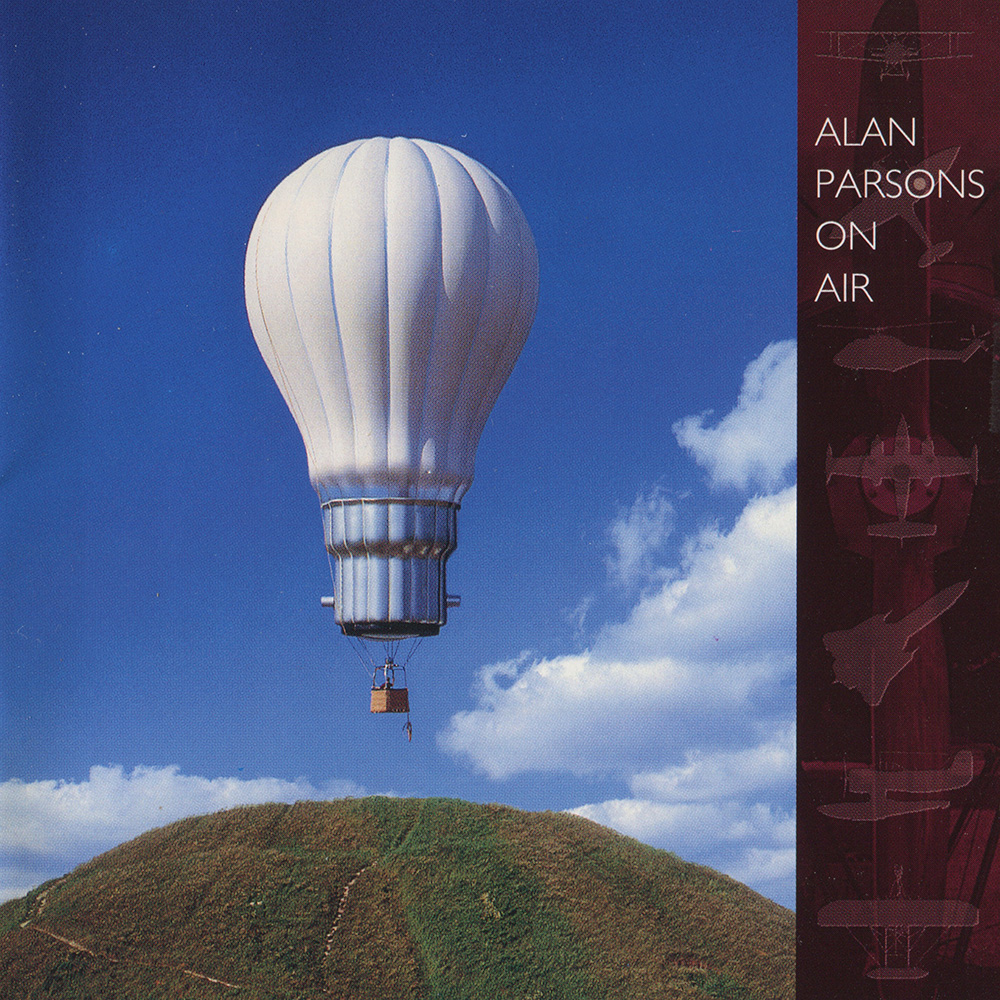
Alan Parsons – On Air
 There’s nothing quite like an Alan Parsons project, whether it’s called that or not. After the sometimes morbid theme of 1993’s Try Anything Once, this album’s focus on flight is a welcome change of pace. The theme is stretched in all directions, from the legend of Icarus to skydiving to altophobia to an instrumental, reminiscent of the Project’s sound circa 1985, constructed around John F. Kennedy’s 1961 speech that initiated the Apollo program. There’s also a song sung by Christopher Cross which could be interpreted as a tribute to astronauts, both fallen and otherwise, everywhere. For many years, I’ve heard numerous critics accuse Parsons of imitating the sound of Pink Floyd (a sound Parsons himself helped establish when he produced and engineered Pink Floyd’s Dark Side Of The Moon, which doesn’t lend the PF imitation criticism much credibility), but for once I have to admit that Parsons has turned out an album which is exceedingly Floydian – or, more accurately, very much like the sound Parsons bestowed upon PF all those years ago. The sound of On Air is driven by guitars, well-harmonized vocals and dreamy sound effects, and not quite so many of the symphonic textures of Parsons projects past. Suffice it to say you should enjoy On Air if you’re a Pink Floyd fan. Featured vocalists include the aforementioned Christopher Cross (yes, the same Mr. Cross of “Sailing” fame), 10cc’s Eric Stewart, Neil Lockwood (late of ELO Part II – aha! There is at last a tenuous connection between Parsons and ELO!), and Graham Dye. The album art is similar to that of Try Anything Once, but features hot air balloons instead of people hanging upside-down from ropes!
There’s nothing quite like an Alan Parsons project, whether it’s called that or not. After the sometimes morbid theme of 1993’s Try Anything Once, this album’s focus on flight is a welcome change of pace. The theme is stretched in all directions, from the legend of Icarus to skydiving to altophobia to an instrumental, reminiscent of the Project’s sound circa 1985, constructed around John F. Kennedy’s 1961 speech that initiated the Apollo program. There’s also a song sung by Christopher Cross which could be interpreted as a tribute to astronauts, both fallen and otherwise, everywhere. For many years, I’ve heard numerous critics accuse Parsons of imitating the sound of Pink Floyd (a sound Parsons himself helped establish when he produced and engineered Pink Floyd’s Dark Side Of The Moon, which doesn’t lend the PF imitation criticism much credibility), but for once I have to admit that Parsons has turned out an album which is exceedingly Floydian – or, more accurately, very much like the sound Parsons bestowed upon PF all those years ago. The sound of On Air is driven by guitars, well-harmonized vocals and dreamy sound effects, and not quite so many of the symphonic textures of Parsons projects past. Suffice it to say you should enjoy On Air if you’re a Pink Floyd fan. Featured vocalists include the aforementioned Christopher Cross (yes, the same Mr. Cross of “Sailing” fame), 10cc’s Eric Stewart, Neil Lockwood (late of ELO Part II – aha! There is at last a tenuous connection between Parsons and ELO!), and Graham Dye. The album art is similar to that of Try Anything Once, but features hot air balloons instead of people hanging upside-down from ropes!
One truly unique feature of On Air is the second CD in the package – a CD-ROM with all sorts of interesting information on the band and on the history of aviation. Aggravatingly, the CD-ROM is formatted in such a way that you can barely tell what you’re doing – after a title screen and some psychedelic sound, a fleet of colorful balloons wafts lazily across the screen. Clicking on larger balloons will take you to sundry bits of information, but you can hardly tell where you’re headed – the balloons seem to sorta-kinda-vaguely follow the order of the song titles. For example, the “Brother Up In Heaven” section of the CD-ROM contains some sombering statistics on air-related deaths in peacetime and in war; “Fall Free” leads to a tribute to a deceased world champion skysurfer; “Cloudbreak” includes an interesting selection of historical aircraft with photos and diagrams; “Blue Blue Sky” part one contains literary, mythological and other references to flying (including Freud’s take on flying dreams); and part two of the same piece will show you very interesting bios and photos of the band, an Alan Parsons Project trivia game (I only got a little over half of them right, it’s tough!), and more. That last section also contains a stripped-down, looped instrumental of “Blue Blue Sky”, which would be worth the price of the second disc alone. But I’m happy to report that both disks will only cost you as much as a single CD. The CD-ROM’s format and user interface, however, are irritating and seem to offer no hints on how to get around. Where you wind up is almost a random selection, and several smaller balloons will simply explode and lead you to a silly message on a screen with a big pink fish (red herring, get it?). The people who put the CD-ROM togther must have been tripping at least some of the time they worked on it! There are also relatively silly and useless sections of the CD-ROM – “So Far Away” plays a few seconds of the song and displays an endless, monotonous loop of an ersatz NASA-like space mission patch. “Apollo”, a selection which could  have linked to a wealth of spaceflight information, is instead a long series of psychedelic graphics and other odd bits. “Too Close To The Sun” plays a snippet of that song and then invites you to design your own wings (!?). I haven’t even found a section for “Can’t Look Down”, I keep encountering the dreaded fish! Overall, both discs are enjoyable, and it’s still good to hear new music from Parsons and friends.
have linked to a wealth of spaceflight information, is instead a long series of psychedelic graphics and other odd bits. “Too Close To The Sun” plays a snippet of that song and then invites you to design your own wings (!?). I haven’t even found a section for “Can’t Look Down”, I keep encountering the dreaded fish! Overall, both discs are enjoyable, and it’s still good to hear new music from Parsons and friends.
- Blue Blue Sky (0:46)
- Too Close To The Sun (5:12)
- Blown By The Wind (5:22)
- Cloudbreak (4:41)
- Can’t Look Down (4:32)
- Brother Up In Heaven (3:57)
- Fall Free (4:20)
- Apollo (6:05)
- So Far Away (4:05)
- One Day To Fly (6:13)
- Blue Blue Sky (4:23)
Released by: River North
Release date: 1996
Total running time: 50:50
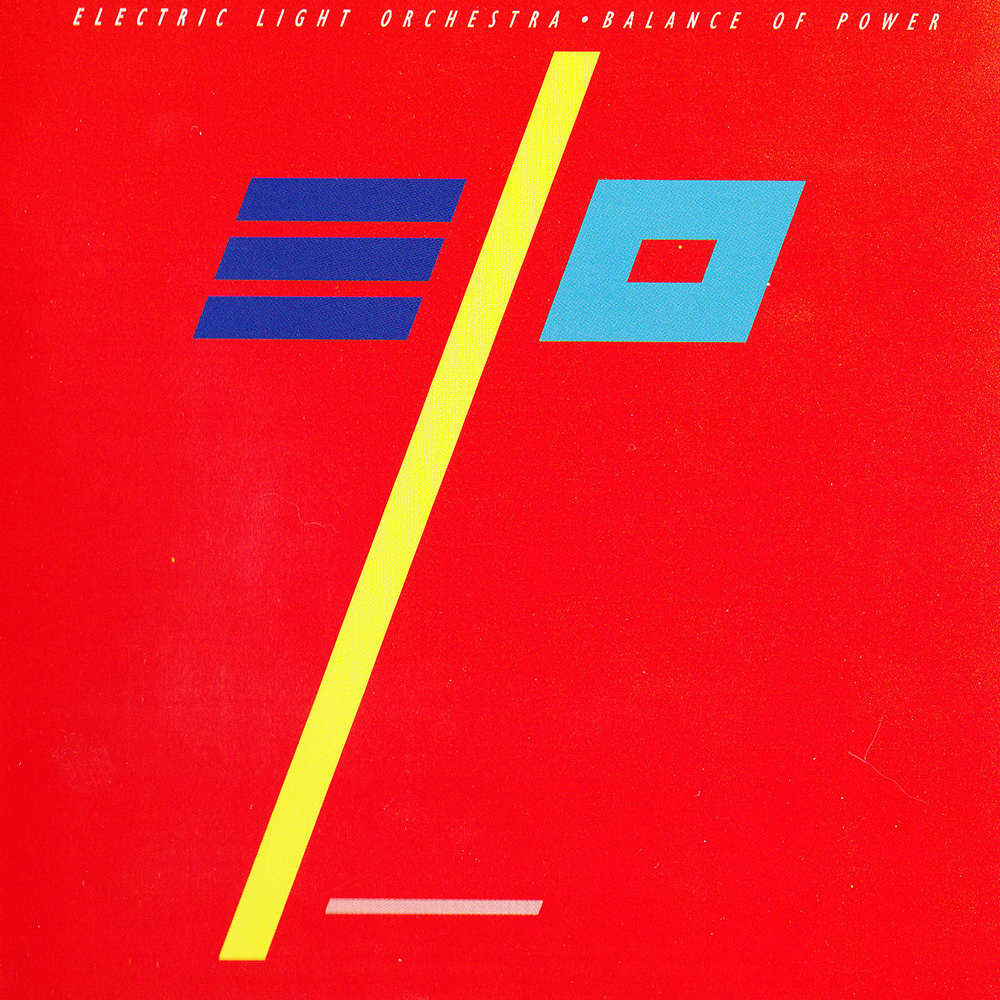
Electric Light Orchestra – Balance Of Power
 This was the last real album recorded by ELO, and don’t let Bev Bevan – who now fronts ELO Part II – tell you otherwise. This modest album, as aptly described in the liner notes of the Afterglow box set four years later, doesn’t sound a whole lot like what you’d come to expect from ELO. It is as different from the mid-70s ELO signature as the group’s classical-heavy-metal-fusion first album was, but moves steadily into the 80s. The great vocal harmonies are still there, but the orchestra is not (unless emulated by keyboards), and the sound just doesn’t seem as full as it
This was the last real album recorded by ELO, and don’t let Bev Bevan – who now fronts ELO Part II – tell you otherwise. This modest album, as aptly described in the liner notes of the Afterglow box set four years later, doesn’t sound a whole lot like what you’d come to expect from ELO. It is as different from the mid-70s ELO signature as the group’s classical-heavy-metal-fusion first album was, but moves steadily into the 80s. The great vocal harmonies are still there, but the orchestra is not (unless emulated by keyboards), and the sound just doesn’t seem as full as it once did. The songs aren’t bad, though – “Without Someone”, “Is It Alright” and “Calling America” sticking out as my favorites and the most authentically ELO-ish – but perhaps this should have been Jeff Lynne’s first solo album instead of the last ELO album.
once did. The songs aren’t bad, though – “Without Someone”, “Is It Alright” and “Calling America” sticking out as my favorites and the most authentically ELO-ish – but perhaps this should have been Jeff Lynne’s first solo album instead of the last ELO album.
- Heaven Only Knows (2:54)
- So Serious (2:41)
- Getting To The Point (4:29)
- Secret Lives (3:28)
- Is It Alright (3:24)
- Sorrow About To Fall (4:03)
- Without Someone (3:51)
- Calling America (3:29)
- Endless Lies (2:58)
- Send It (3:39)
Released by: Epic
Release date: 1986
Total running time: 34:56
Electric Light Orchestra – Secret Messages
 Originally conceived and recorded as a double album, Secret Messages was for some reason cut down to a single album and released in 1983, bestowing upon the world a somewhat grating single “Rock ‘n’ Roll Is King” (I’m sure you’ll remember the chorus: “Wham-a-lam-a, bam-a-lam-a, rock ‘n’ roll is king!”) and then, for all intents and purposes, disappearing into undeserved obscurity. This entry on my Damn Near Perfect Album List is, like Time before it, an example of just how good ELO was in the 80s, even if radio didn’t think so. I can’t think of a song on here that I don’t like, with the possible exception of the CD bonus track “Time After Time”, which bears
Originally conceived and recorded as a double album, Secret Messages was for some reason cut down to a single album and released in 1983, bestowing upon the world a somewhat grating single “Rock ‘n’ Roll Is King” (I’m sure you’ll remember the chorus: “Wham-a-lam-a, bam-a-lam-a, rock ‘n’ roll is king!”) and then, for all intents and purposes, disappearing into undeserved obscurity. This entry on my Damn Near Perfect Album List is, like Time before it, an example of just how good ELO was in the 80s, even if radio didn’t think so. I can’t think of a song on here that I don’t like, with the possible exception of the CD bonus track “Time After Time”, which bears more resemblance to Jeff Lynne’s work on Electric Dreams than to ELO, and perhaps there lies a hint as to why Secret Messages was halved prior to release, though some of the deleted songs heard on Afterglow are just fine. My highest recommendations!
more resemblance to Jeff Lynne’s work on Electric Dreams than to ELO, and perhaps there lies a hint as to why Secret Messages was halved prior to release, though some of the deleted songs heard on Afterglow are just fine. My highest recommendations!
- Secret Messages (4:43)
- Loser Gone Wild (5:25)
- Bluebird (4:06)
Take Me On And On (5:02)
- Time After Time (4:00)
- Four Little Diamonds (4:05)
- Stranger (4:27)
- Danger Ahead (3:53)
- Letter From Spain (2:51)
- Train of Gold (4:21)
- Rock ‘n’ Roll is King (3:45)
Released by: Jet
Release date: 1983
Total running time: 46:38
Electric Light Orchestra – Time
 Though this isn’t my favorite ELO album of the 1980s, it contains my favorite song by the group which is also quite likely my favorite song of all time. I can’t say enough good things about “Rain Is Falling”, which achieves an almost perfect balance of orchestral and rock elements, and the vocals aren’t echoed too much (a common ELO failing of which even I tire), and it’s the band at its peak – at least for me. I could take up the rest of this whole review on this one song, but there are a whole dozen other tunes on Time, including the mechanical “Yours Truly, 2095” (with the great lyric “I met someone who looks a lot like you / She does the things you do / but she is an IBM”!), the laid-back harmonies of
Though this isn’t my favorite ELO album of the 1980s, it contains my favorite song by the group which is also quite likely my favorite song of all time. I can’t say enough good things about “Rain Is Falling”, which achieves an almost perfect balance of orchestral and rock elements, and the vocals aren’t echoed too much (a common ELO failing of which even I tire), and it’s the band at its peak – at least for me. I could take up the rest of this whole review on this one song, but there are a whole dozen other tunes on Time, including the mechanical “Yours Truly, 2095” (with the great lyric “I met someone who looks a lot like you / She does the things you do / but she is an IBM”!), the laid-back harmonies of “The Lights Go Down”, and “21st Century Man”. As always, most people will remember the album’s singles, “Twilight”, “Here Is The News”, and the coffee achiever song “Hold On Tight” (as in hold on tight to your dream). I highly recommend this one, as I do most ELO albums!
“The Lights Go Down”, and “21st Century Man”. As always, most people will remember the album’s singles, “Twilight”, “Here Is The News”, and the coffee achiever song “Hold On Tight” (as in hold on tight to your dream). I highly recommend this one, as I do most ELO albums!

- Prologue (1:16)
- Twilight (3:42)
- Yours Truly, 2095 (3:12)
- Ticket to the Moon (4:07)
- The Way Life’s Meant To Be (4:39)
- Another Heart Breaks (3:48)
- Rain Is Falling (3:55)
- From the End of the World (3:16)
- The Lights Go Down (3:34)
- Here Is The News (3:45)
- 21st Century Man (4:09)
- Hold On Tight (3:06)
- Epilogue (1:32)
Released by: Jet
Release date: 1981
Total running time: 44:01
Xanadu – music by Olivia Newton-John & ELO
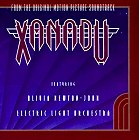 At the time of this review, Xanadu doesn’t seem to have been pressed on CD in the States, at least not recently, so I had to get a Japanese import, but at least the Japanese realized where the true value of this movie’s music was and put the ELO tracks first! (Oh, all right, just to be fair, I really, really like Olivia Newton-John’s “Magic”, and the big-band/rock combo “Dancin'” featuring The Tubes is really nifty. There, I admitted it.) Among the ELO tracks, the only weak entry is “Xanadu” itself, but even so
At the time of this review, Xanadu doesn’t seem to have been pressed on CD in the States, at least not recently, so I had to get a Japanese import, but at least the Japanese realized where the true value of this movie’s music was and put the ELO tracks first! (Oh, all right, just to be fair, I really, really like Olivia Newton-John’s “Magic”, and the big-band/rock combo “Dancin'” featuring The Tubes is really nifty. There, I admitted it.) Among the ELO tracks, the only weak entry is “Xanadu” itself, but even so it’s not a bad song. It may not be the lost holy grail that ELO fans would really like to hear – Jeff Lynne’s abandoned instrumental score for the movie itself – but in general, the music was better than the movie.
it’s not a bad song. It may not be the lost holy grail that ELO fans would really like to hear – Jeff Lynne’s abandoned instrumental score for the movie itself – but in general, the music was better than the movie.

- I’m Alive (3:47)
- The Fall (3:36)
- Don’t Walk Away (4:47)
- All Over The World (4:05)
- Xanadu (with Olivia Newton-John) (3:28)
Olivia Newton-John tracks:- Magic (4:28)
- Suddenly – with Cliff Richard (4:00)
- Dancin’ – with the Tubes (5:15)
- Suspended in Time (3:53)
- Whenever You’re Away From Me / with Gene Kelly (4:18)
Released by: MCA
Release date: 1980
Total running time: 41:37
Electric Light Orchestra – Discovery
 For me, this is ELO’s low ebb, the point at which they pretty much hit bottom. But I suppose nearly every band must have come close – even the Alan Parsons Project broke into an embarassingly disco-esque boogie in the middle of “The Voice” from their 1977 album, and so ELO was bound to go disco, however briefly. Sadly, it seems to be this phase which everyone remembers, consigning ELO to a fate of forever being relegated to Hits of the 70s! collections. “Last Train To London” is just about my least favorite ELO song of all time – it’s got good bass work, and that’s really all I can say in its favor. “Don’t Bring Me Down” is okay, though I preferred the later version played by the group live, which transformed the
For me, this is ELO’s low ebb, the point at which they pretty much hit bottom. But I suppose nearly every band must have come close – even the Alan Parsons Project broke into an embarassingly disco-esque boogie in the middle of “The Voice” from their 1977 album, and so ELO was bound to go disco, however briefly. Sadly, it seems to be this phase which everyone remembers, consigning ELO to a fate of forever being relegated to Hits of the 70s! collections. “Last Train To London” is just about my least favorite ELO song of all time – it’s got good bass work, and that’s really all I can say in its favor. “Don’t Bring Me Down” is okay, though I preferred the later version played by the group live, which transformed the  song from another miserable disco tune into a real rocker, and “Shine A Little Love” is only marginally better. So is there anything good about Discovery? Well, yeah, at least a couple of things. “Confusion” and “Need Her Love” are good songs, while “Wishing” is pretty much average ELO. I can’t really recommend this unless you, like myself, happen to be an ELO fanatic/completist.
song from another miserable disco tune into a real rocker, and “Shine A Little Love” is only marginally better. So is there anything good about Discovery? Well, yeah, at least a couple of things. “Confusion” and “Need Her Love” are good songs, while “Wishing” is pretty much average ELO. I can’t really recommend this unless you, like myself, happen to be an ELO fanatic/completist.

- Shine a Little Love (4:42)
- Confusion (3:43)
- Need Her Love (5:12)
- The Diary of Horace Wimp (4:17)
- Last Train to London (4:33)
- Midnight Blue (4:19)
- On The Run (3:56)
- Wishing (4:14)
- Don’t Bring Me Down (4:02)
Released by: Jet
Release date: 1979
Total running time: 38:58